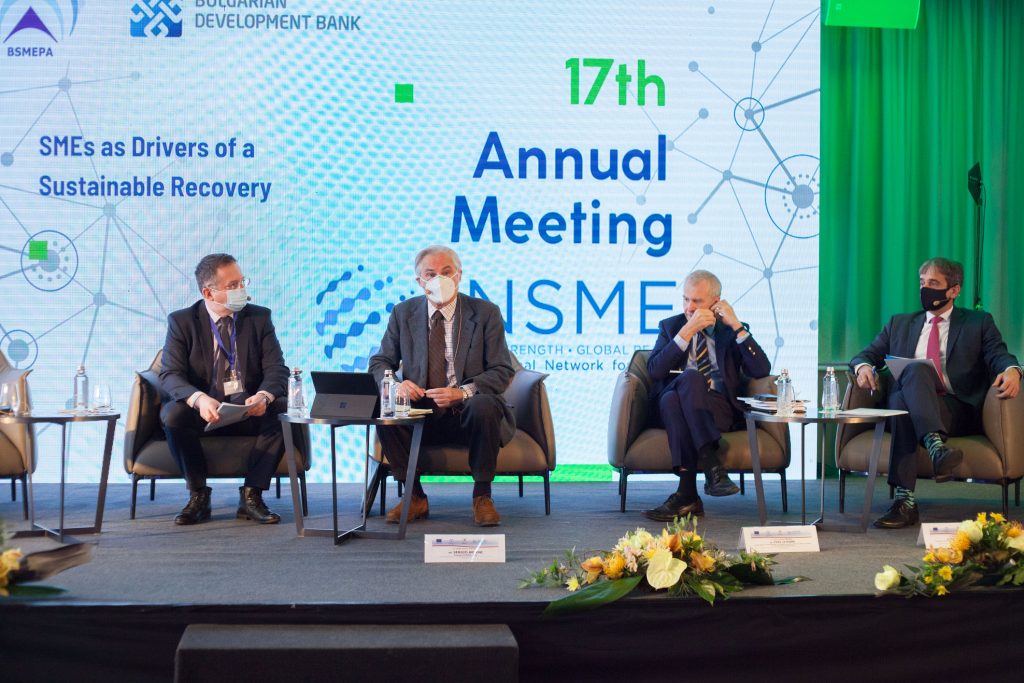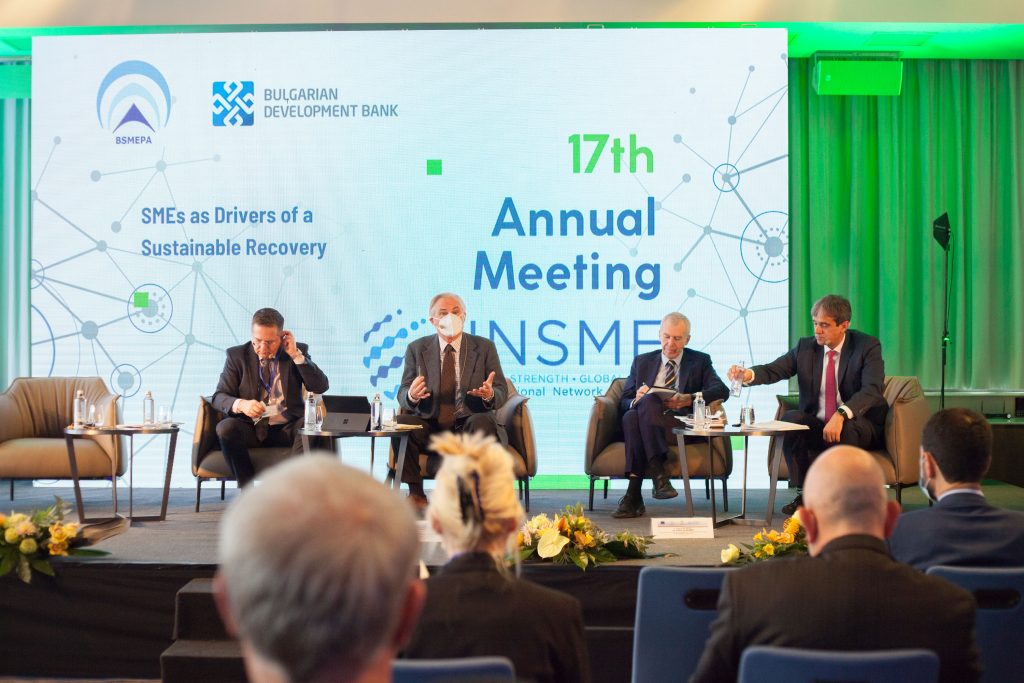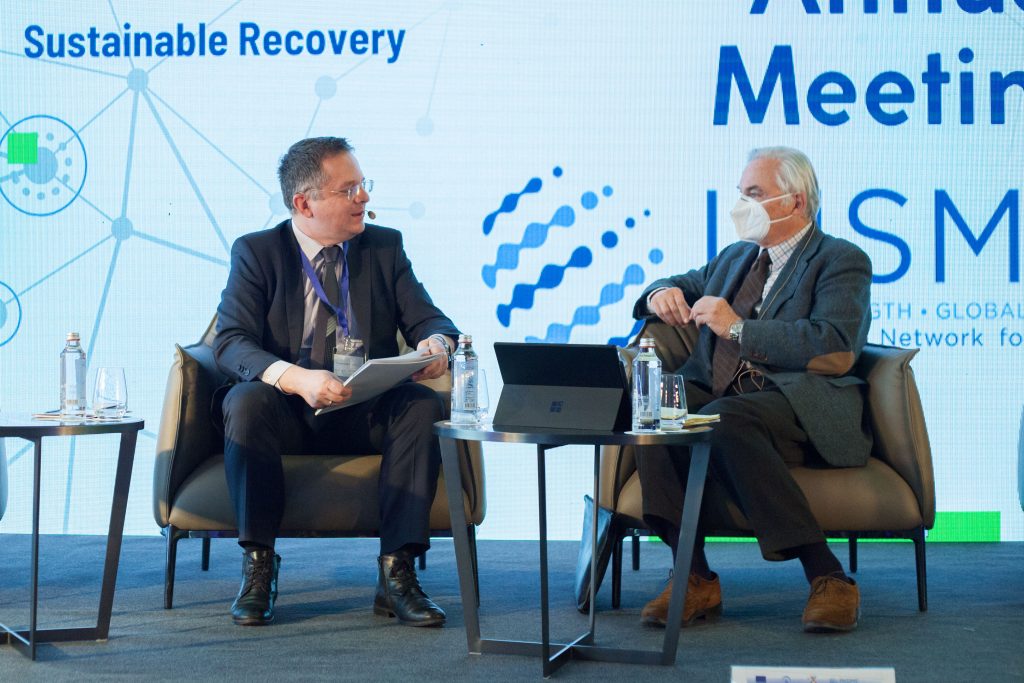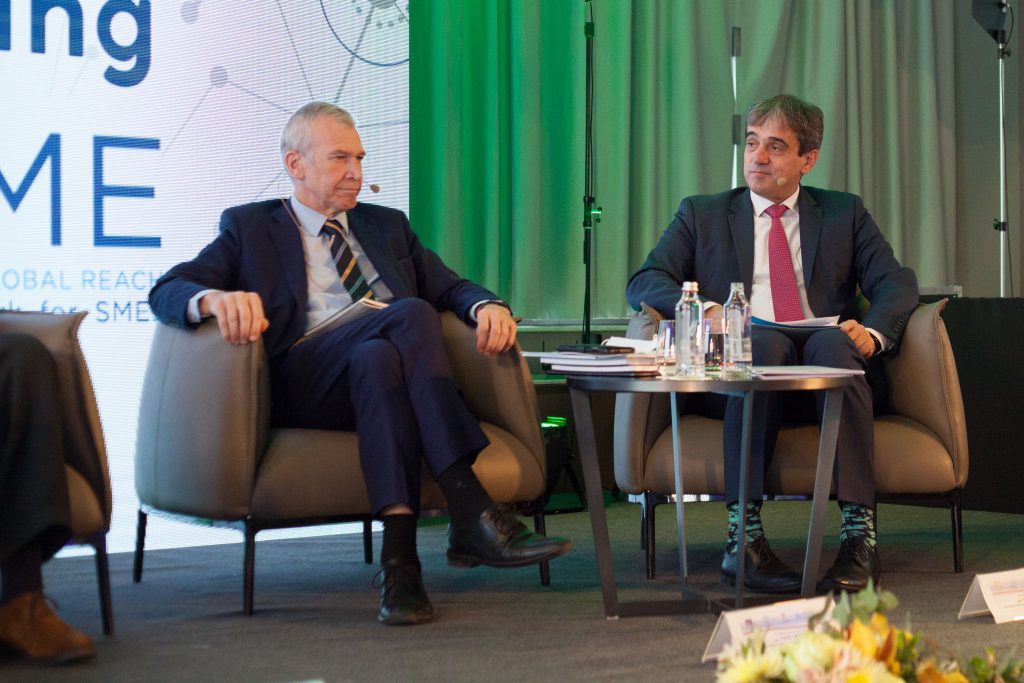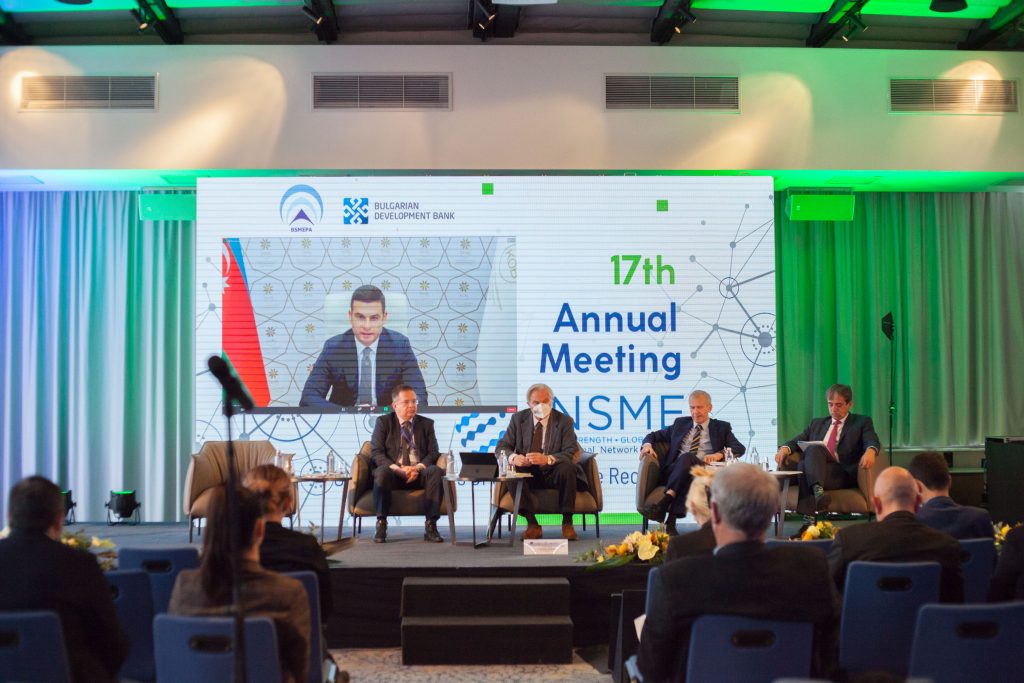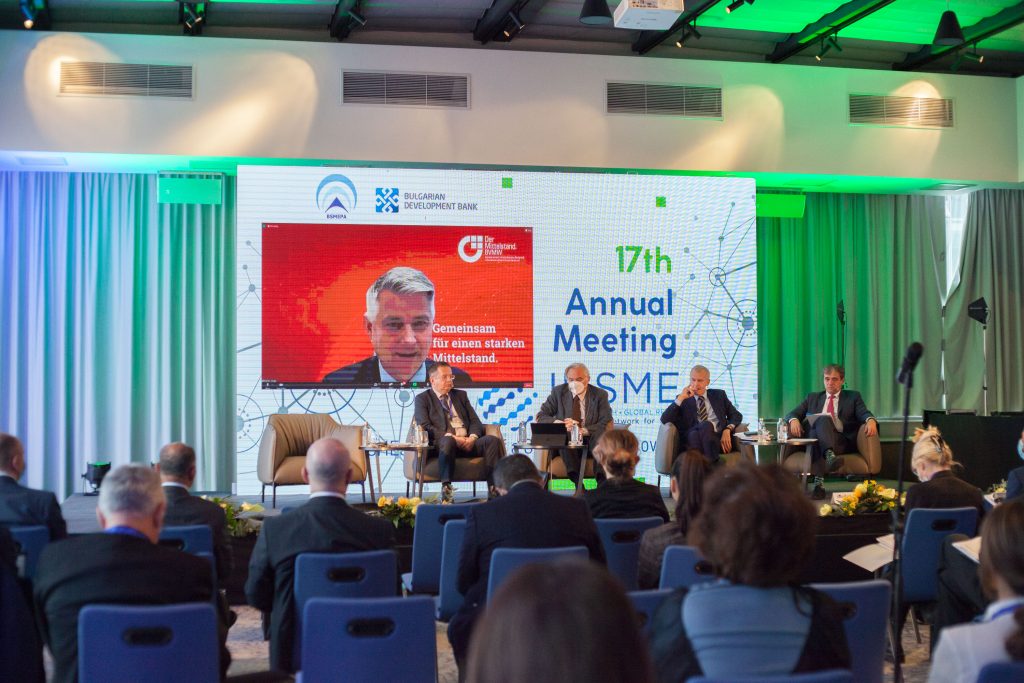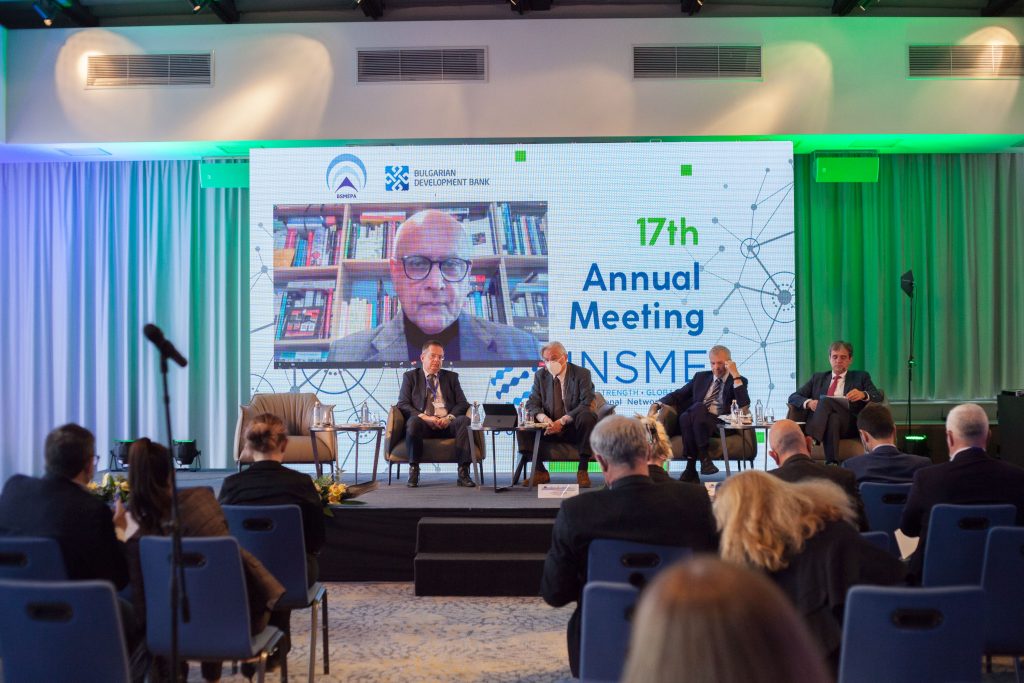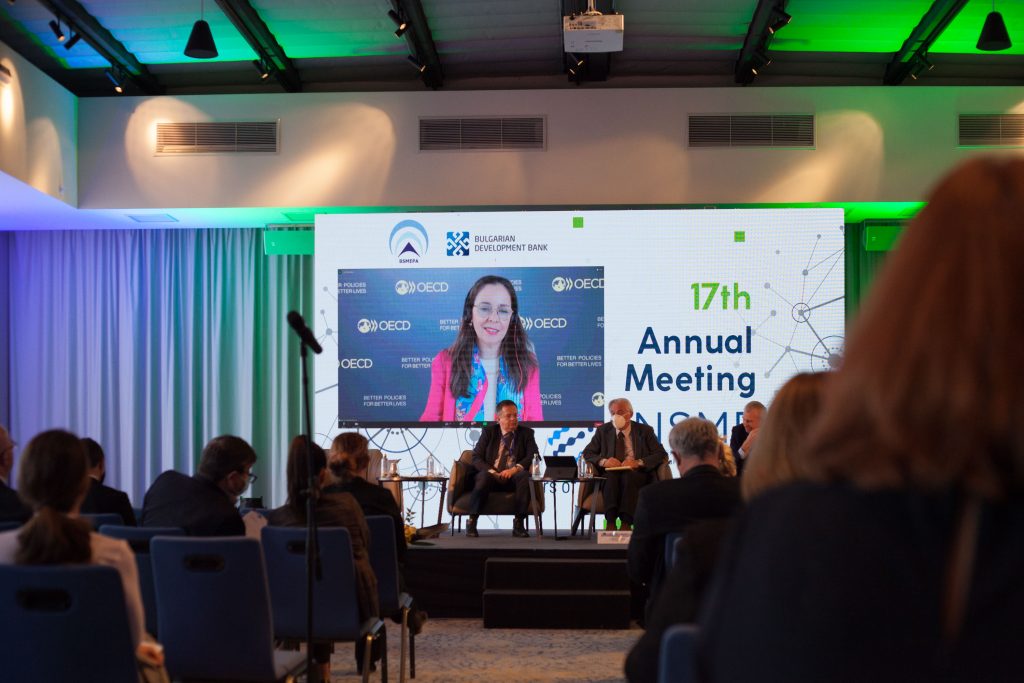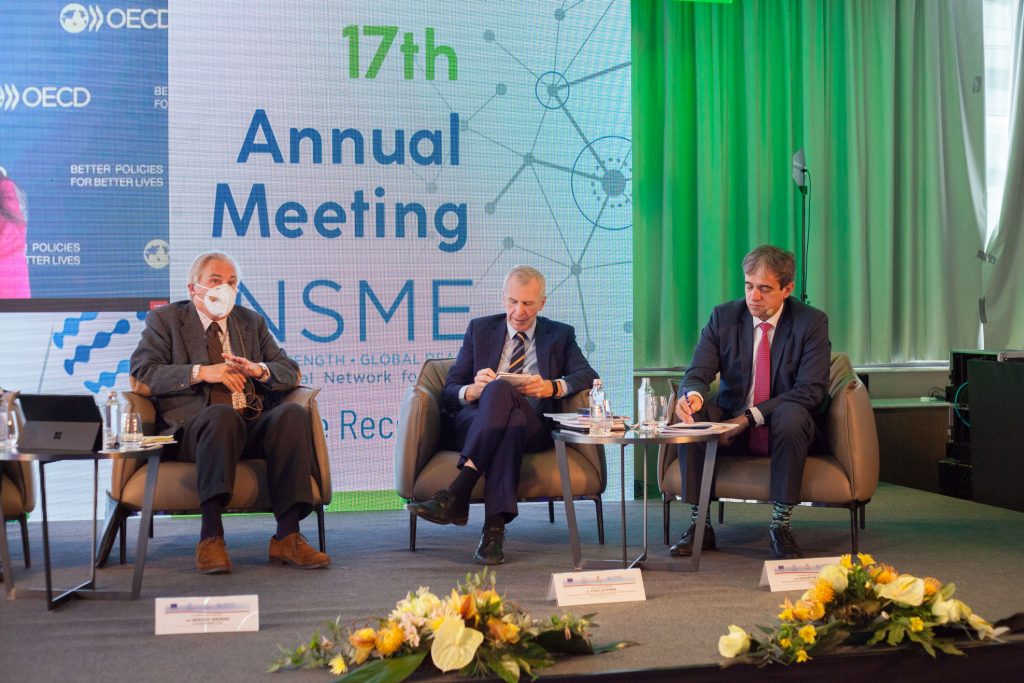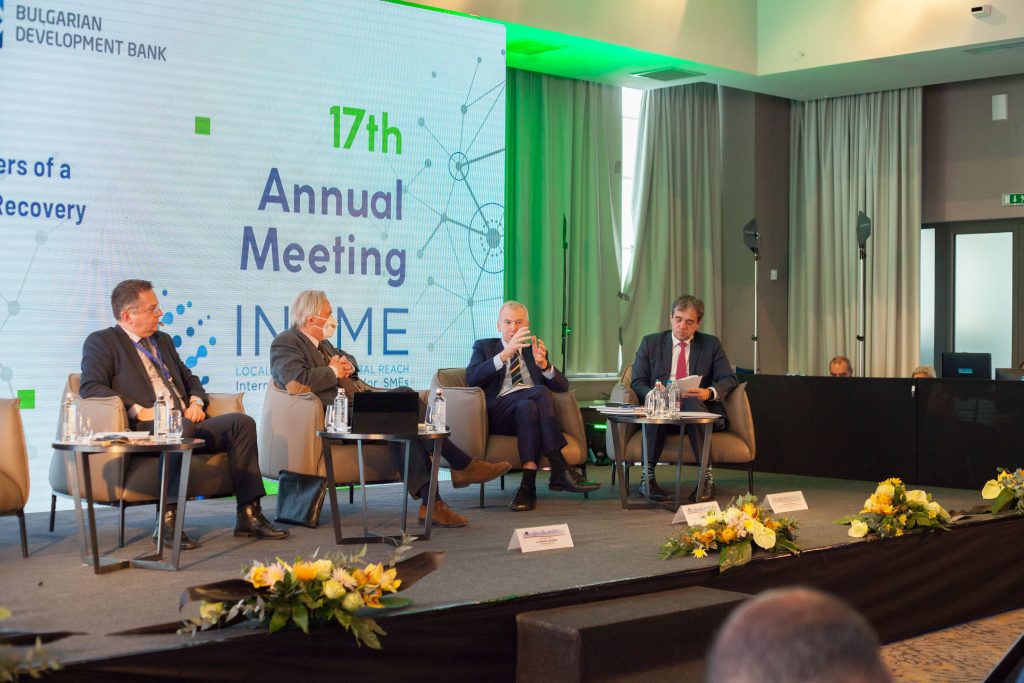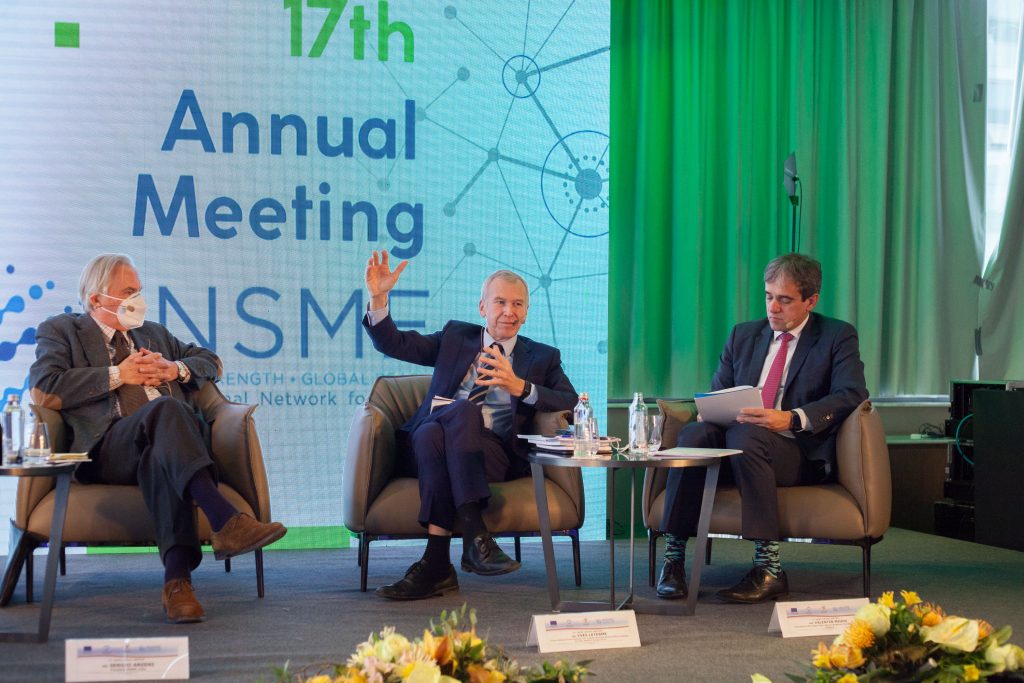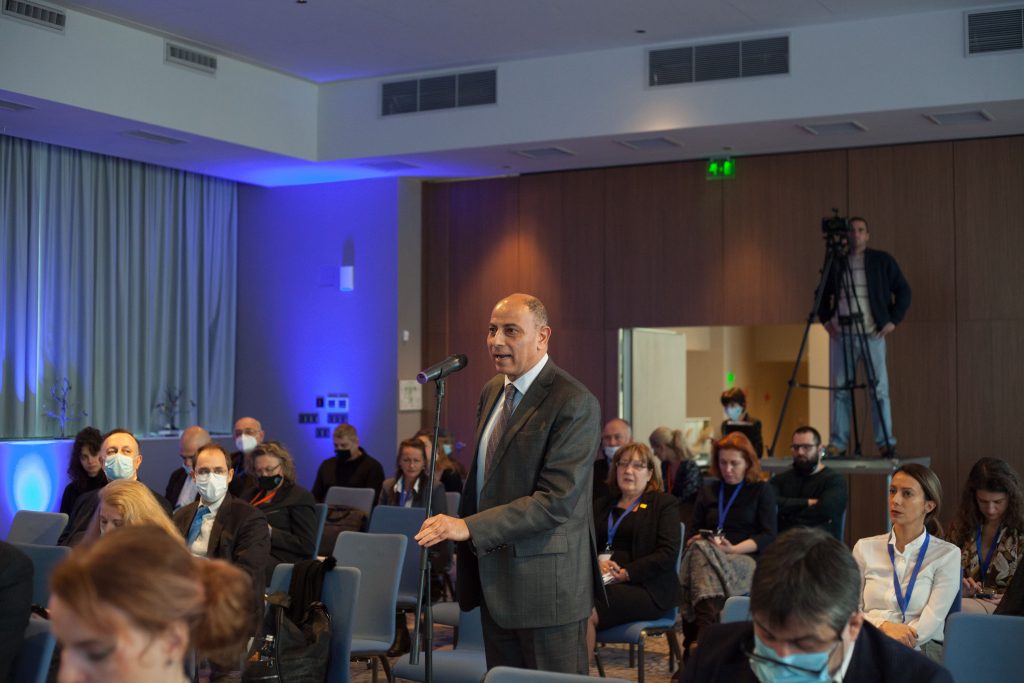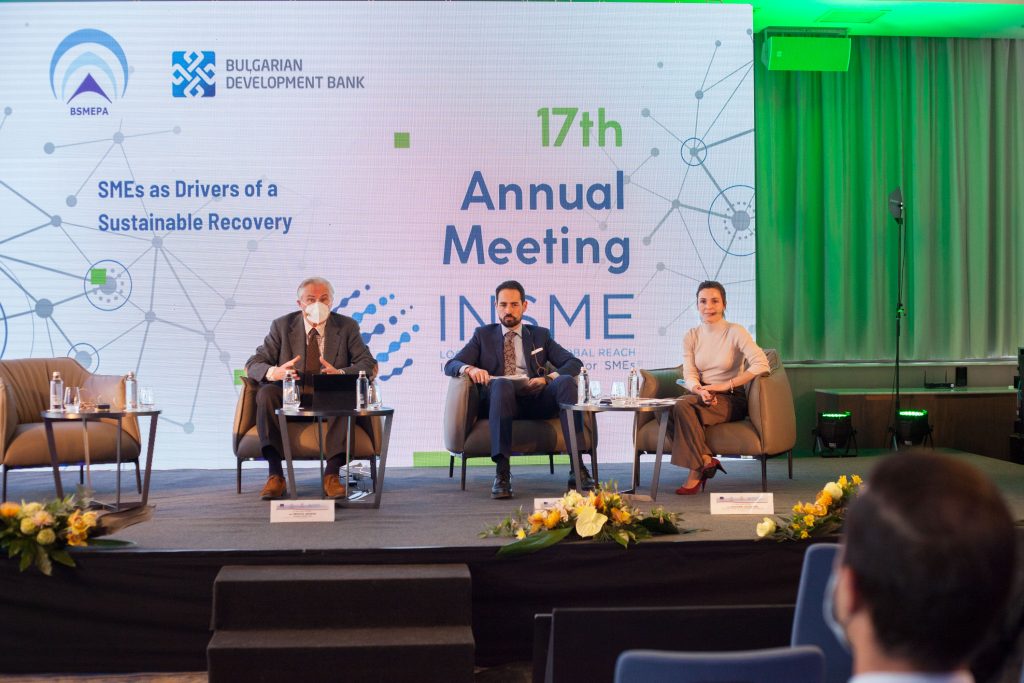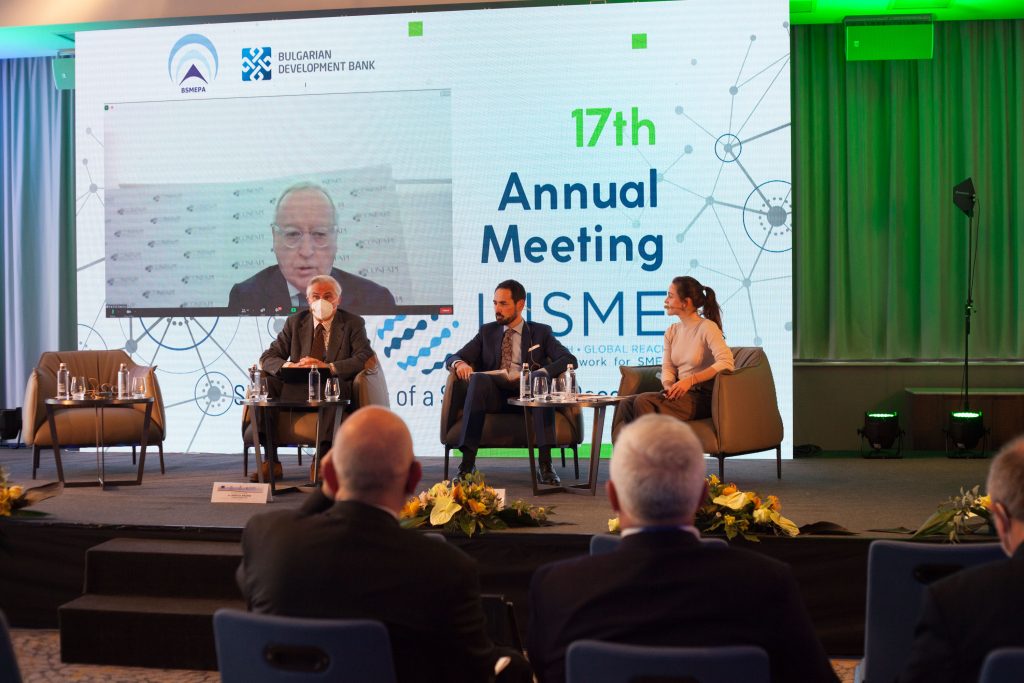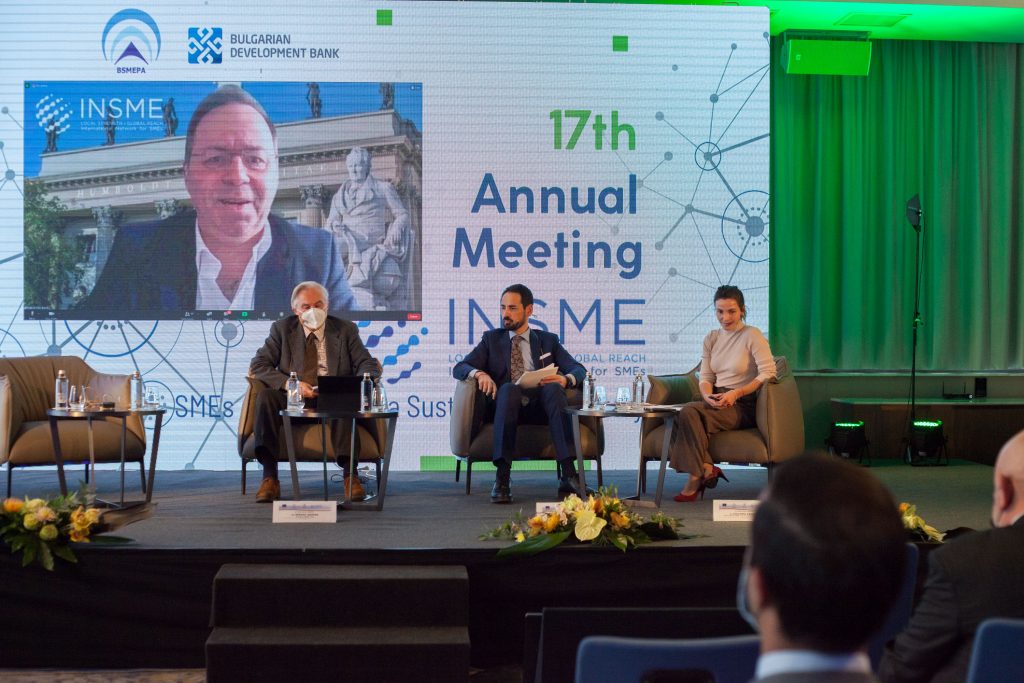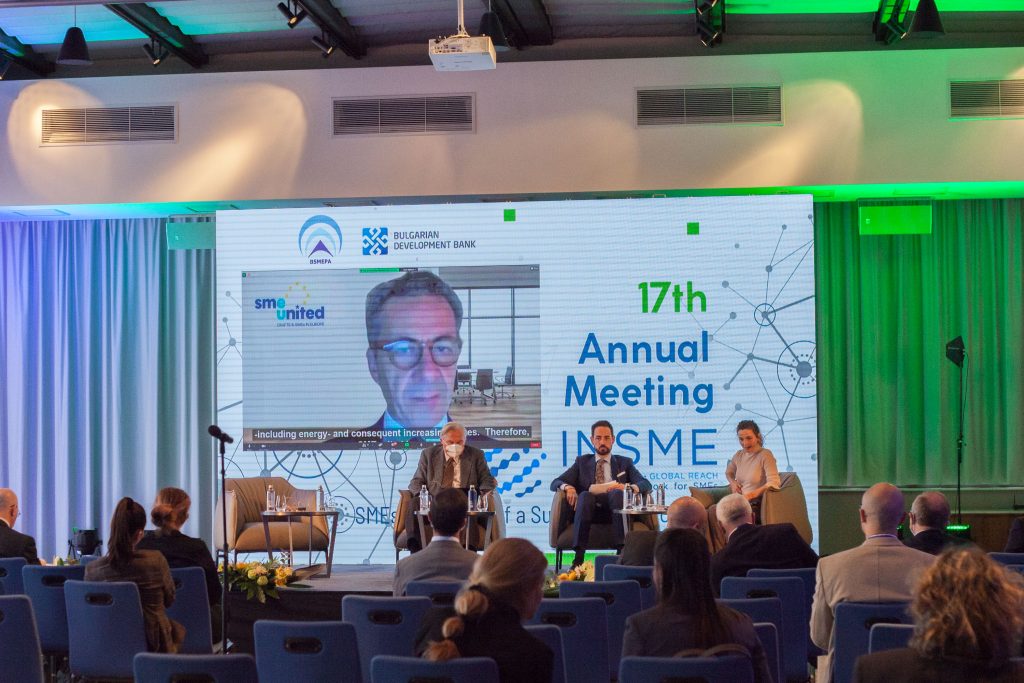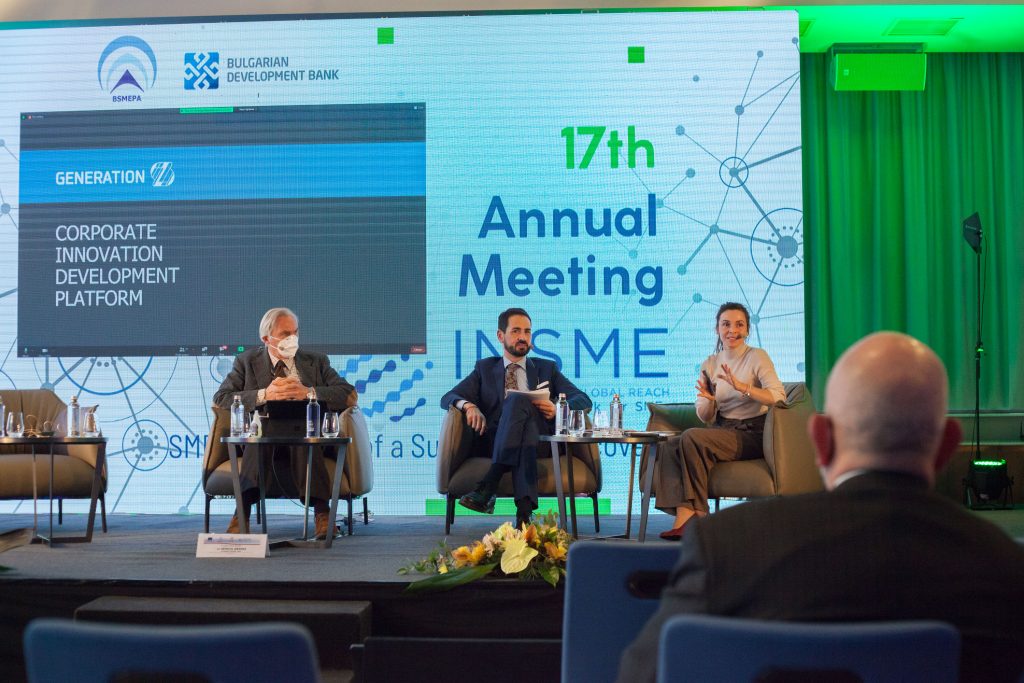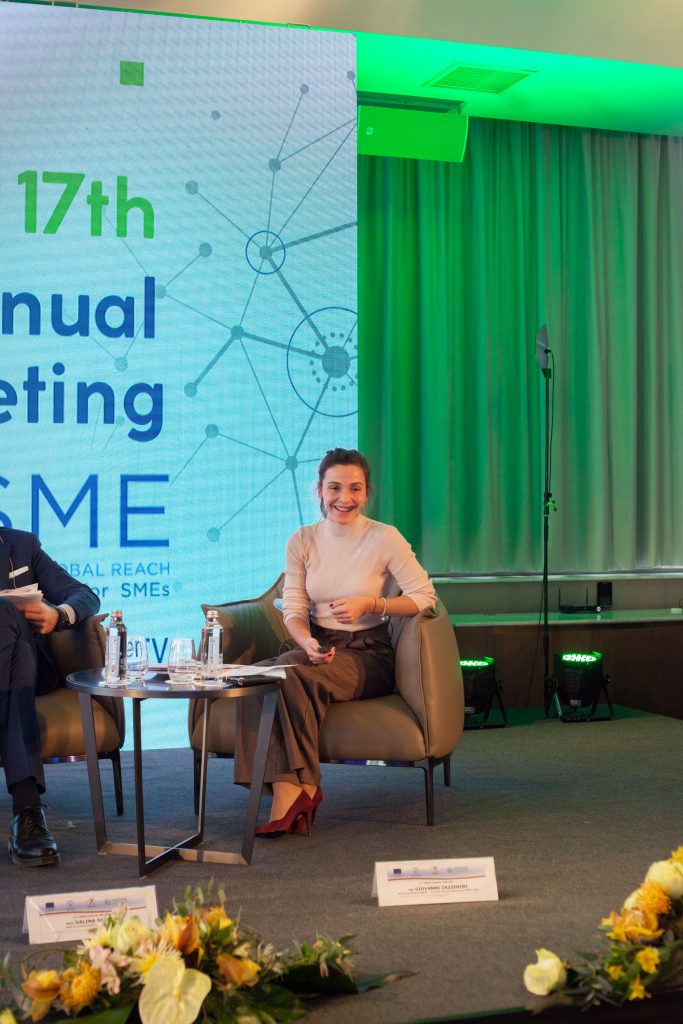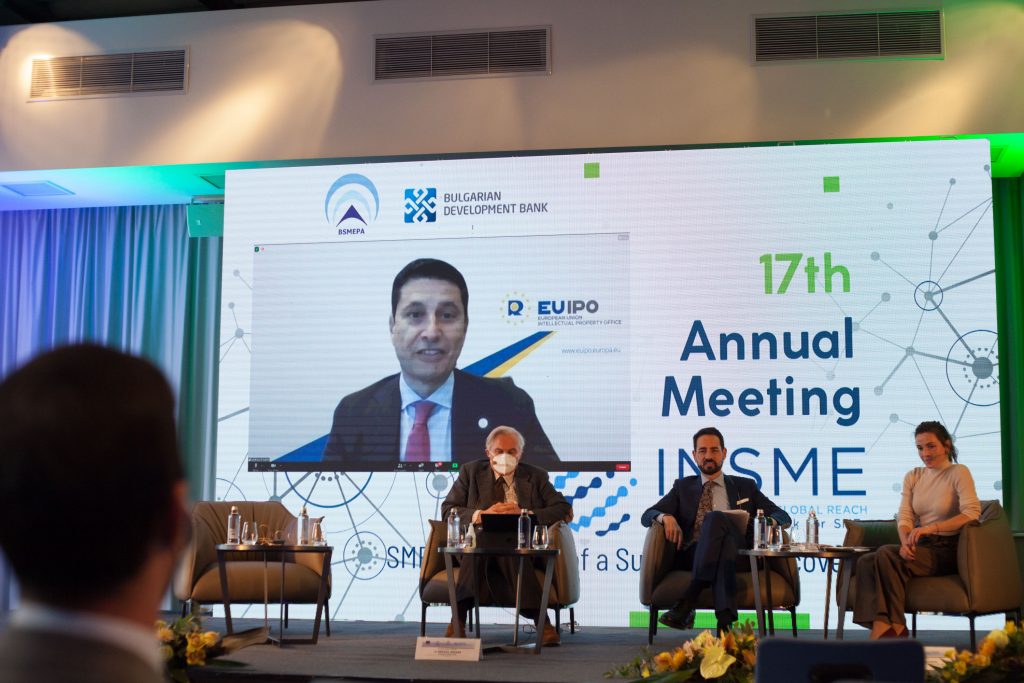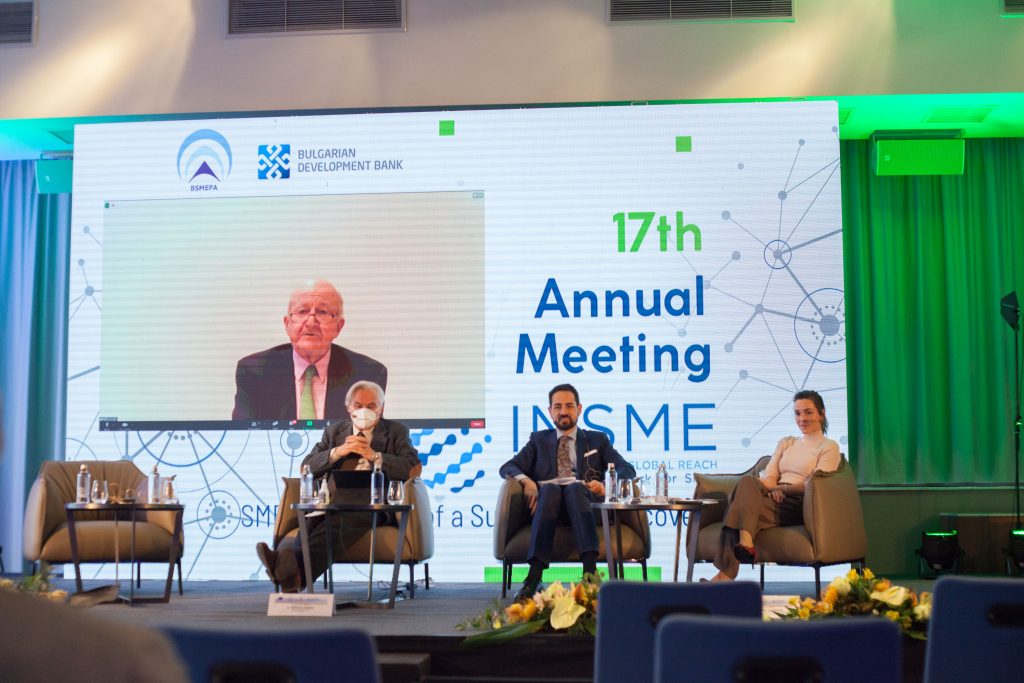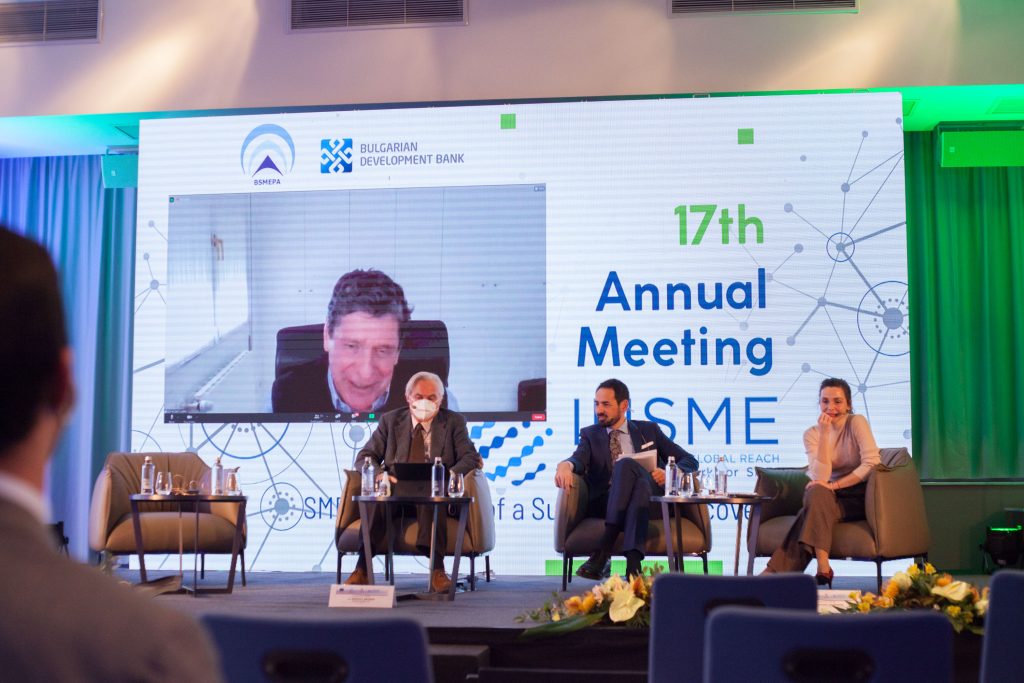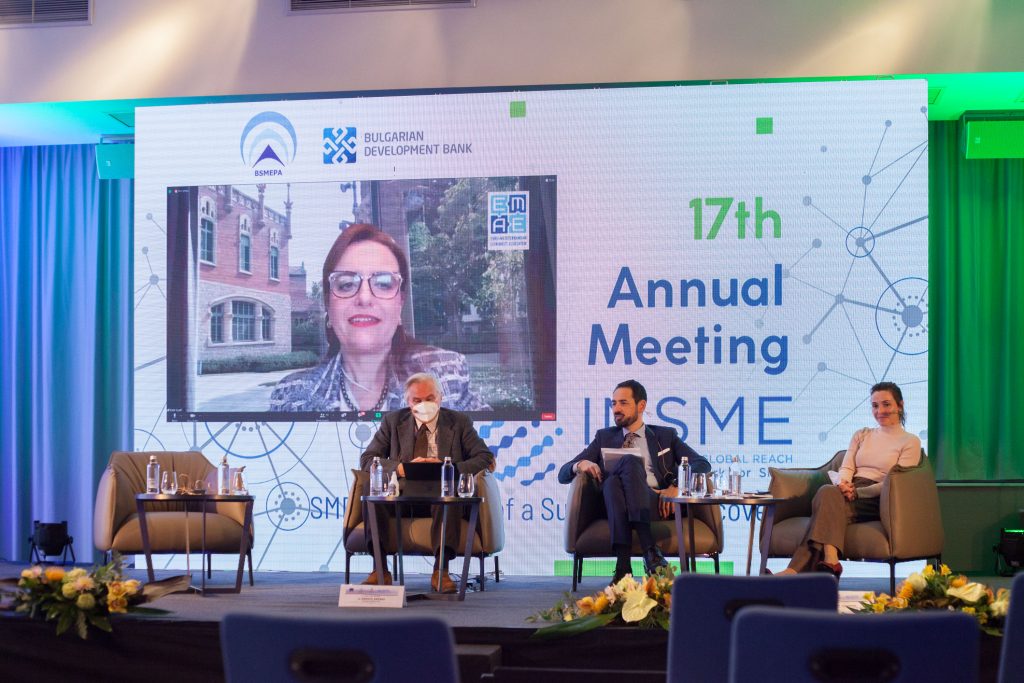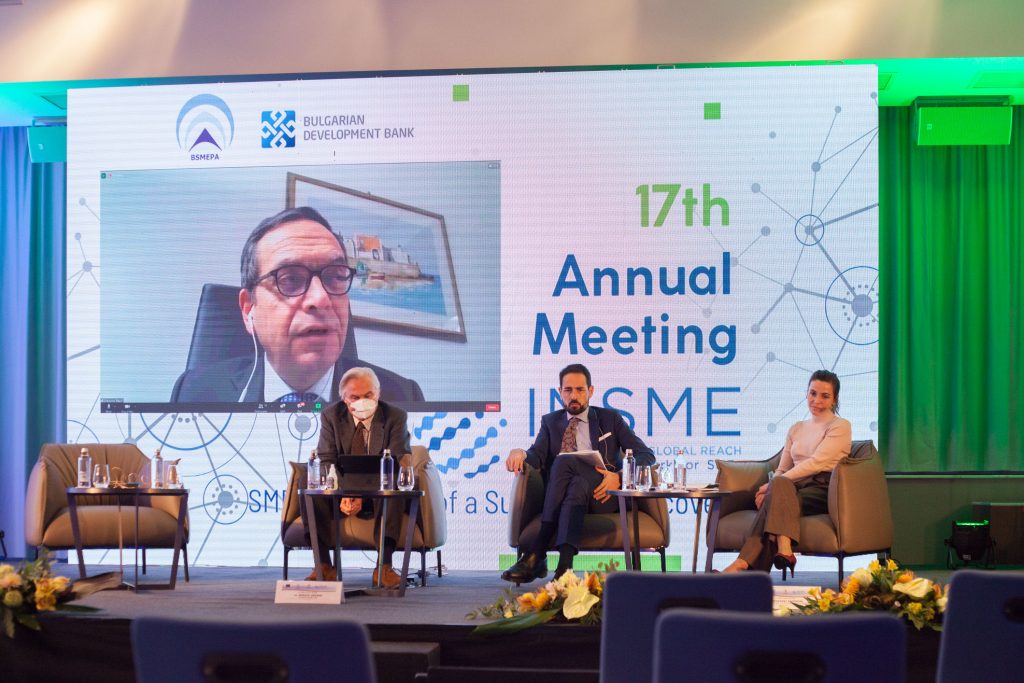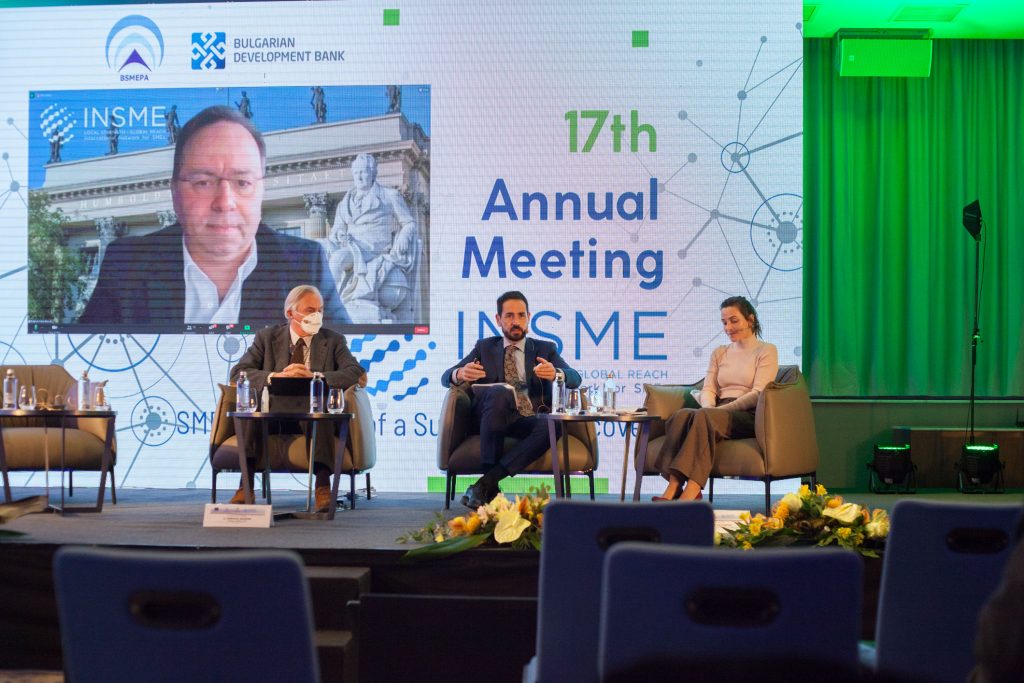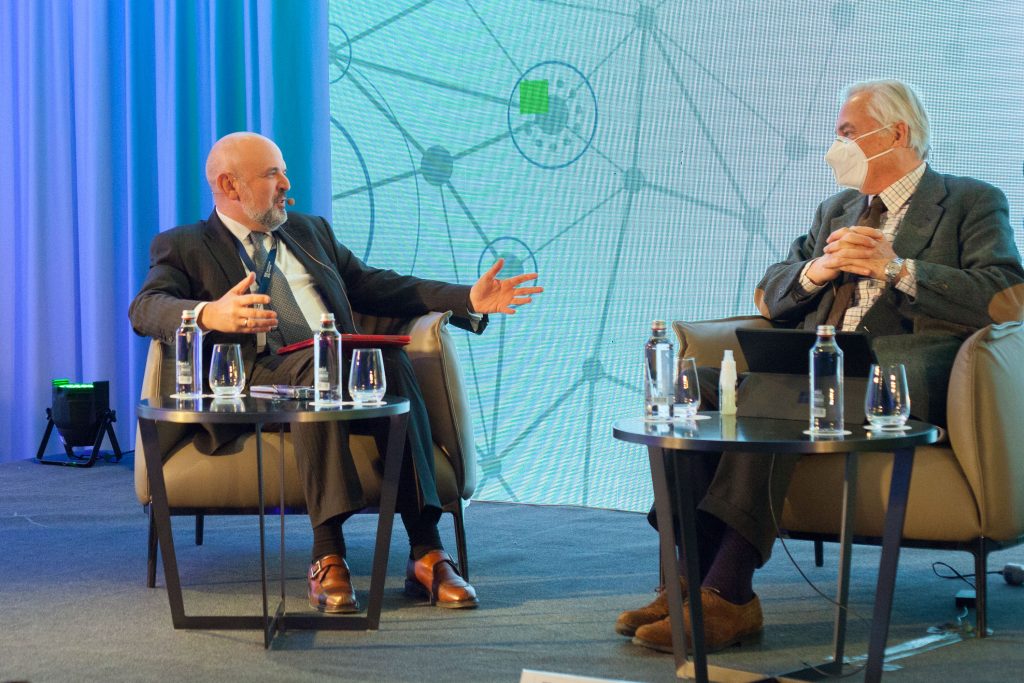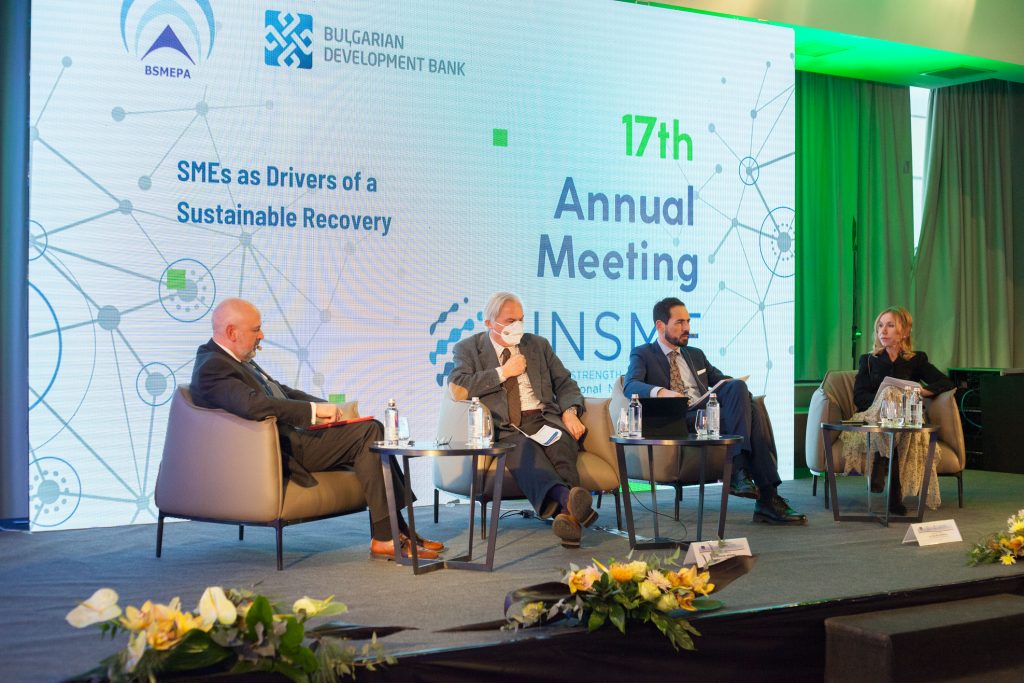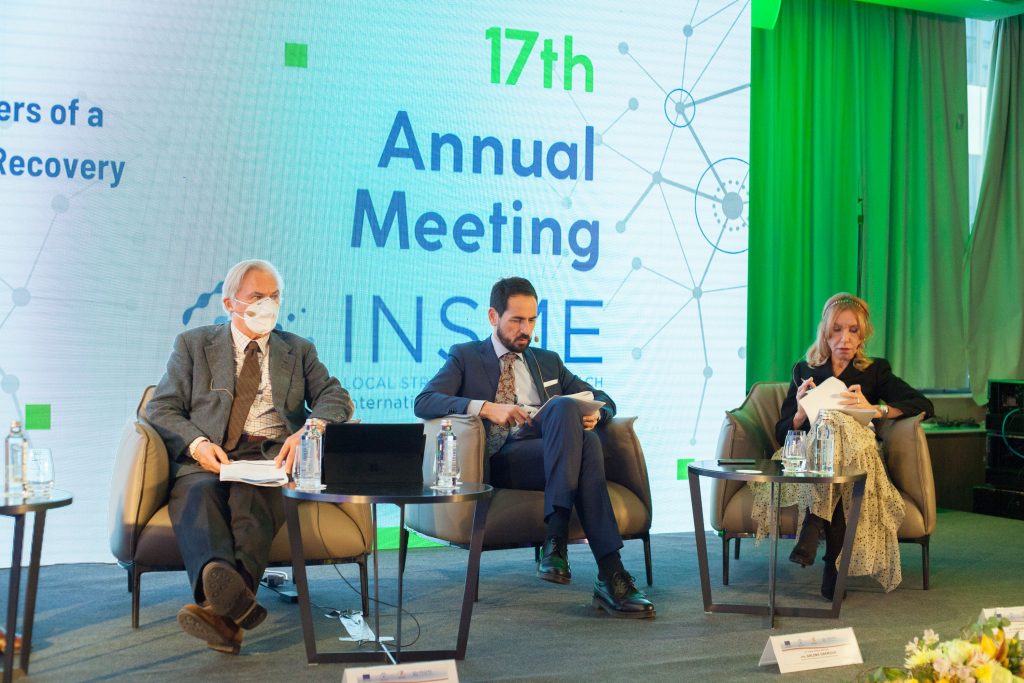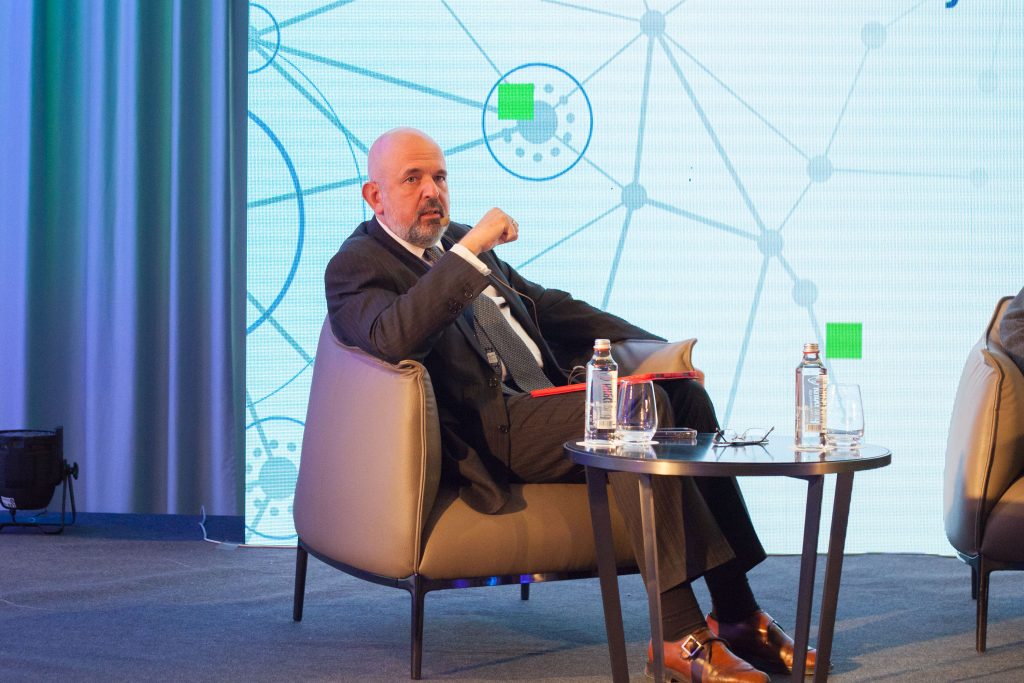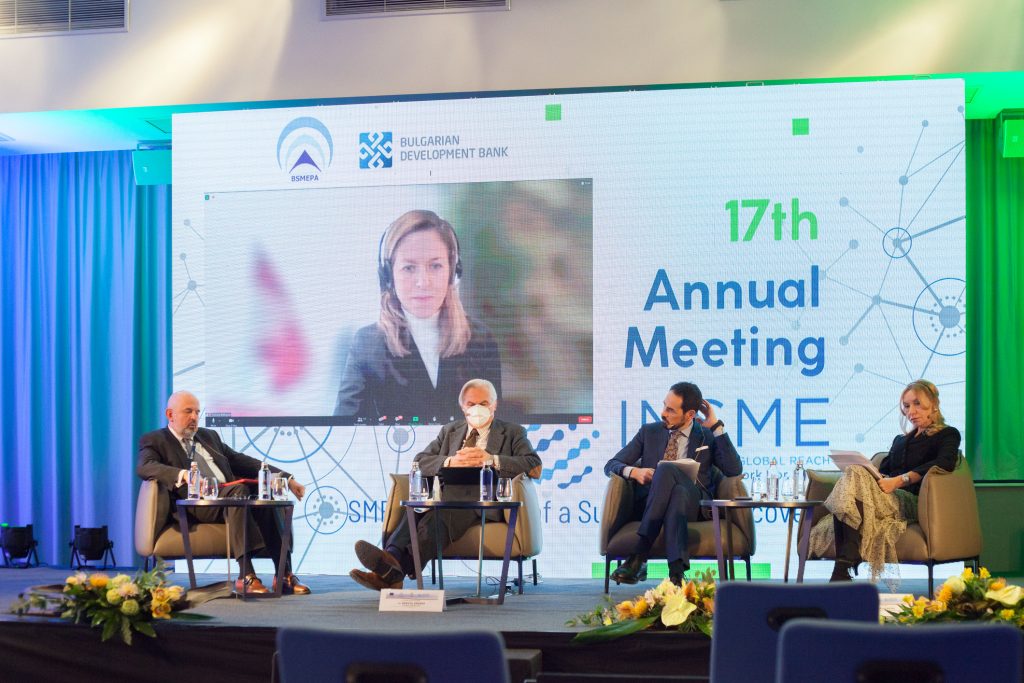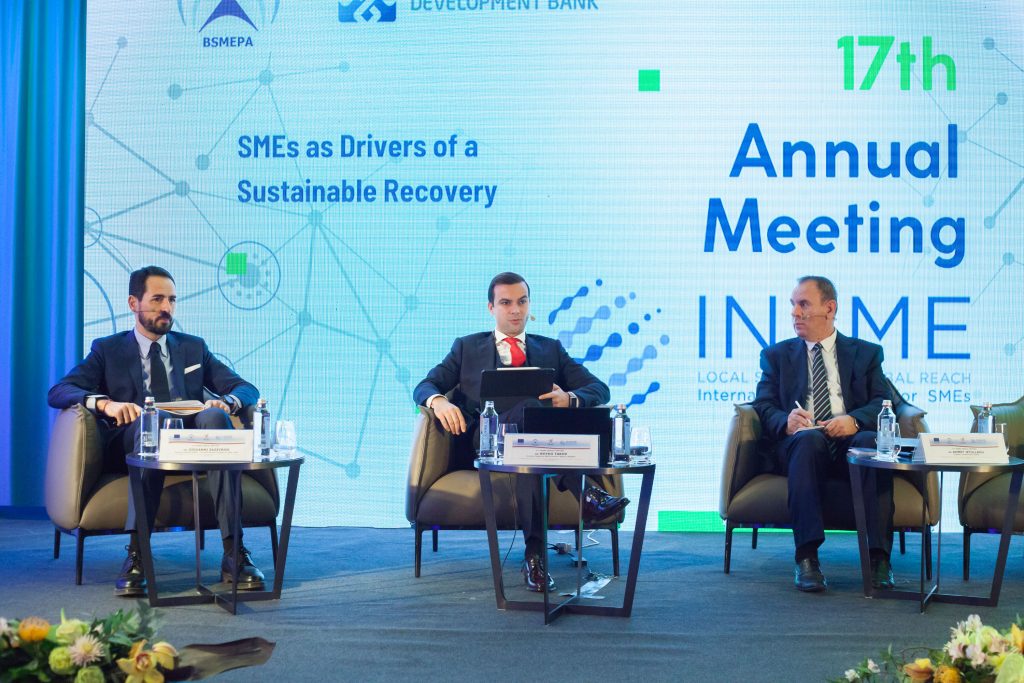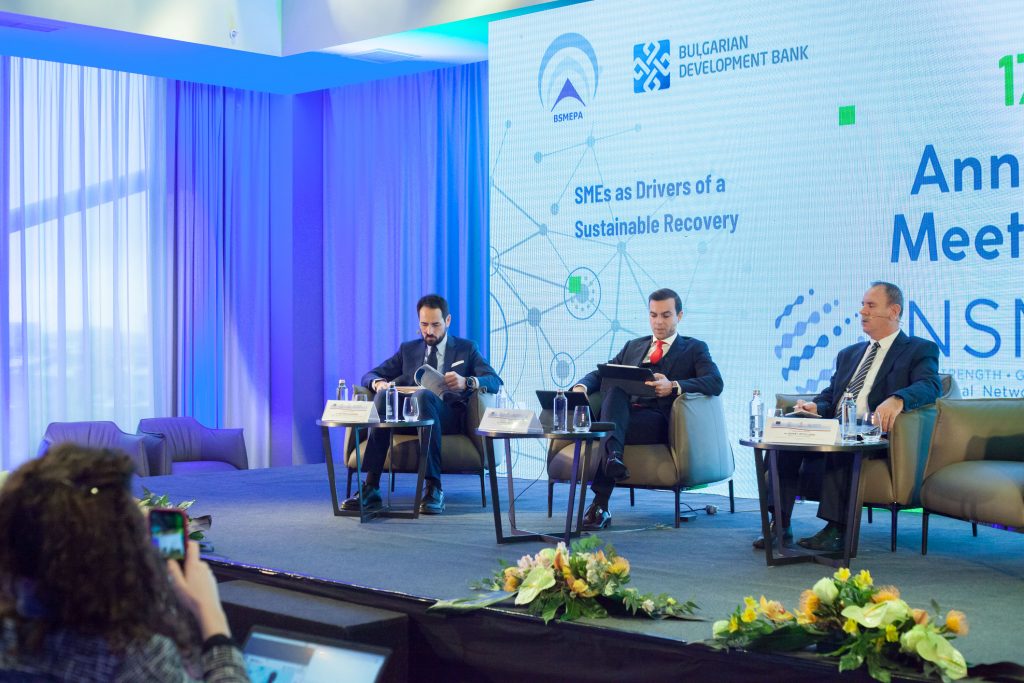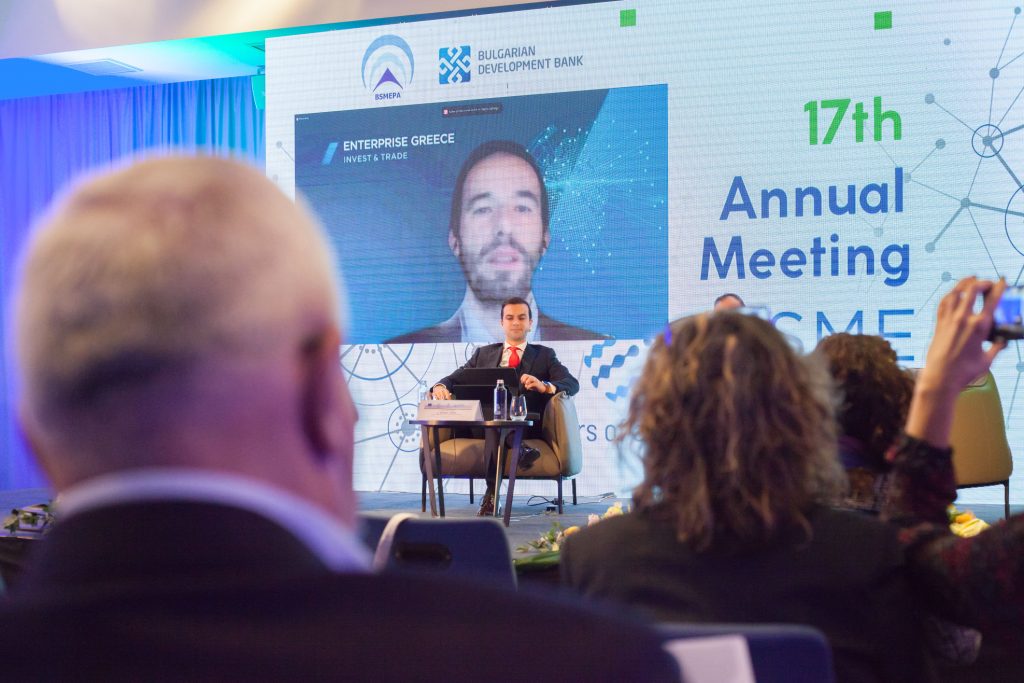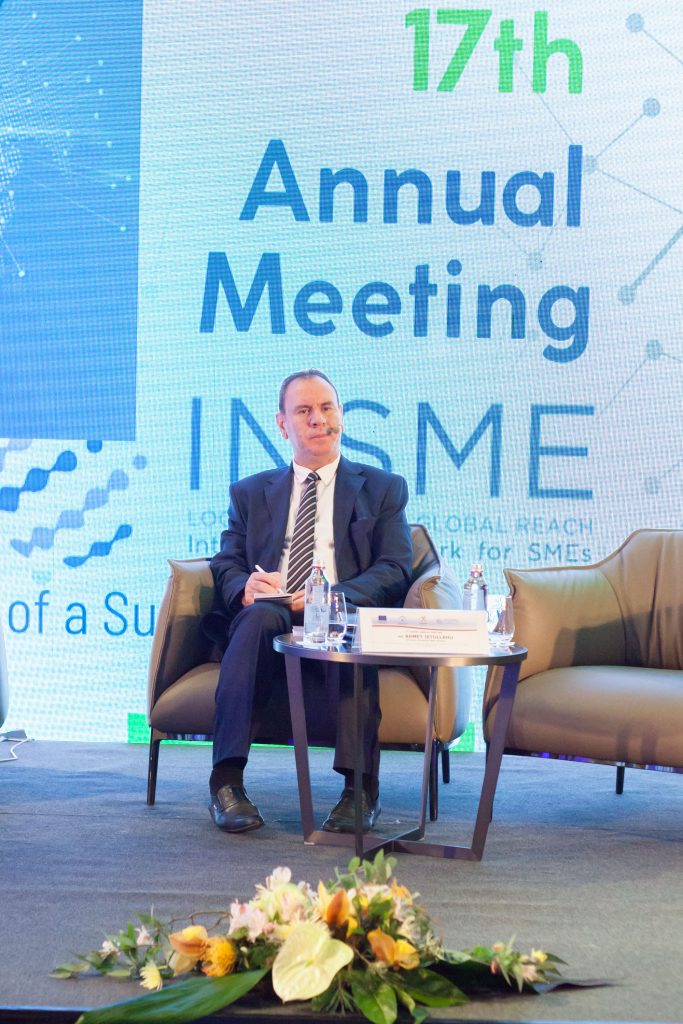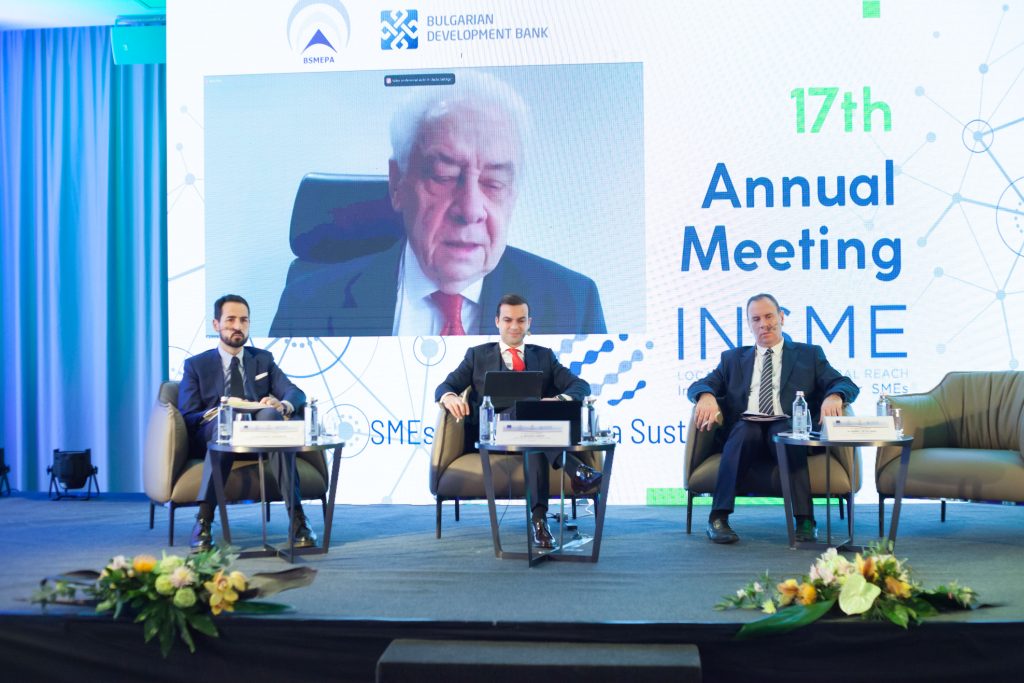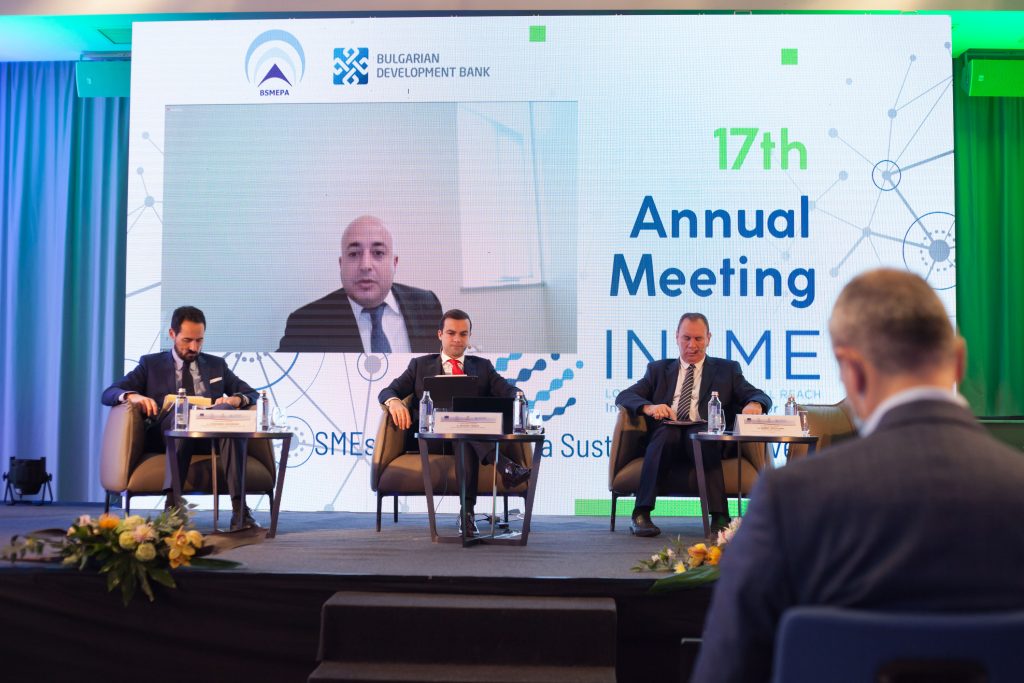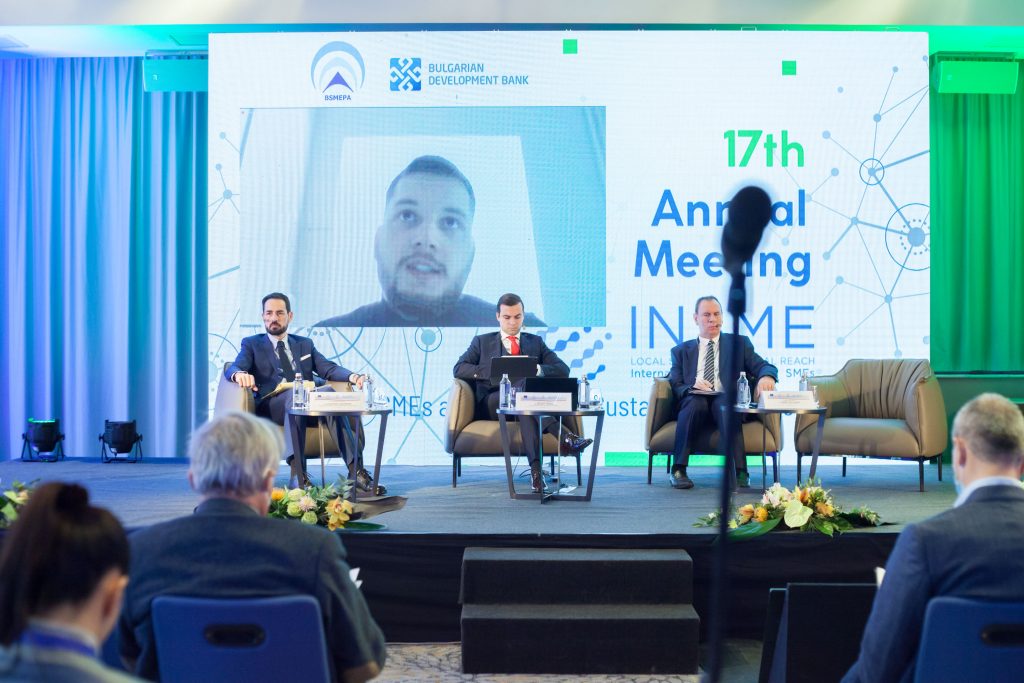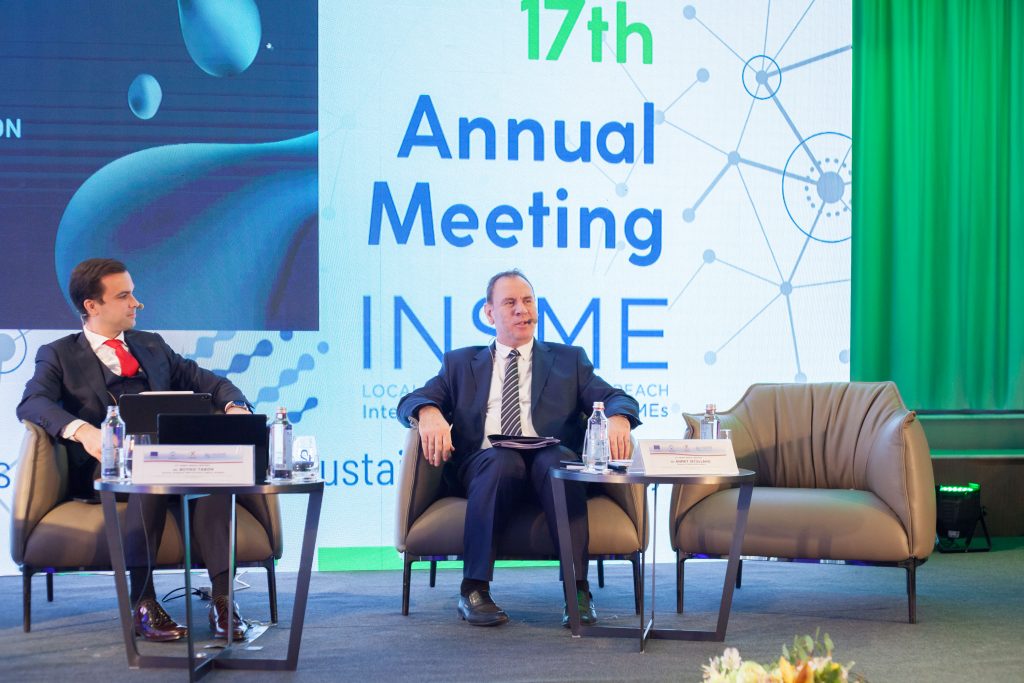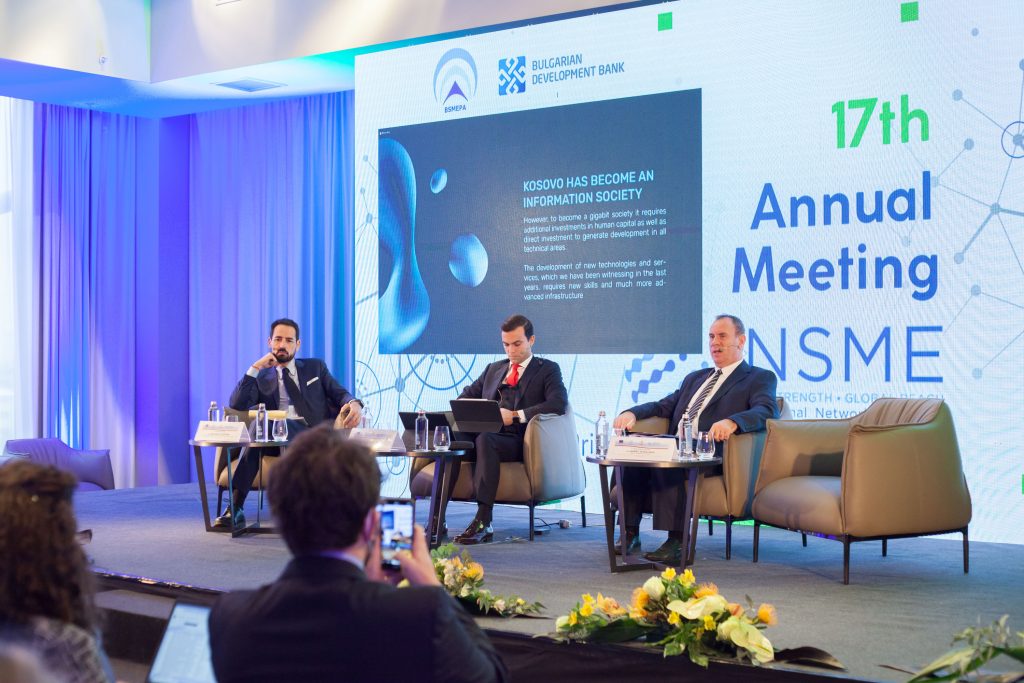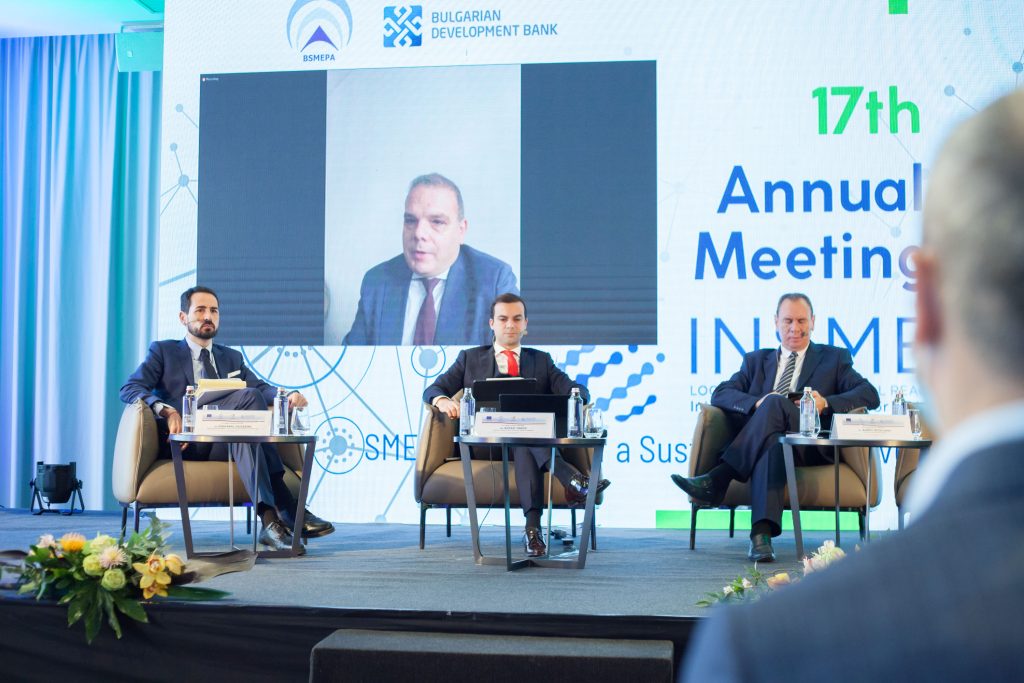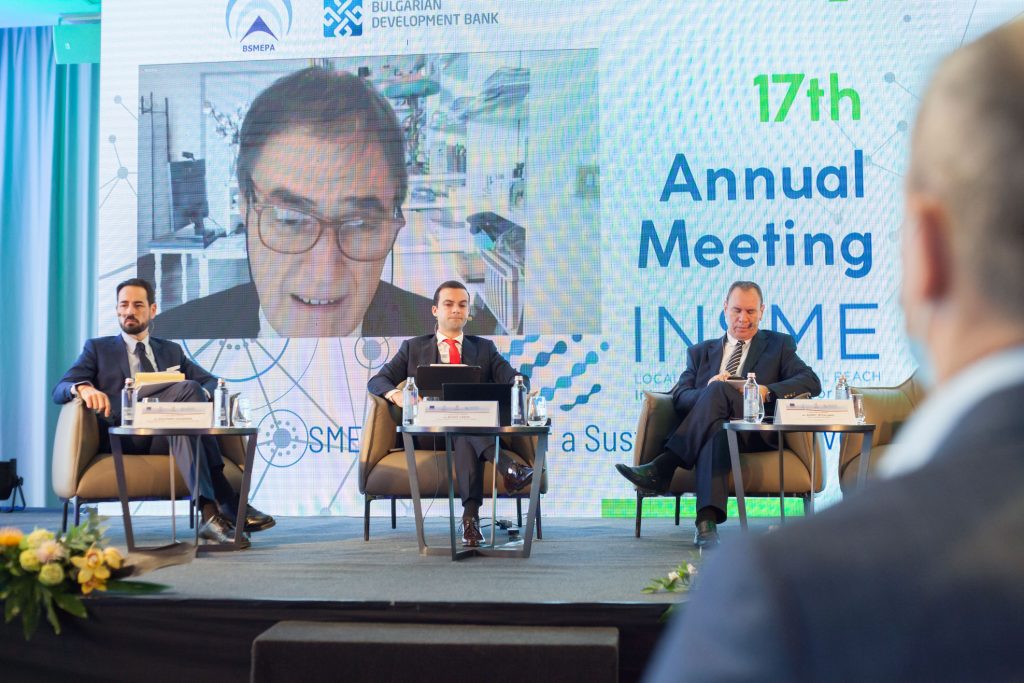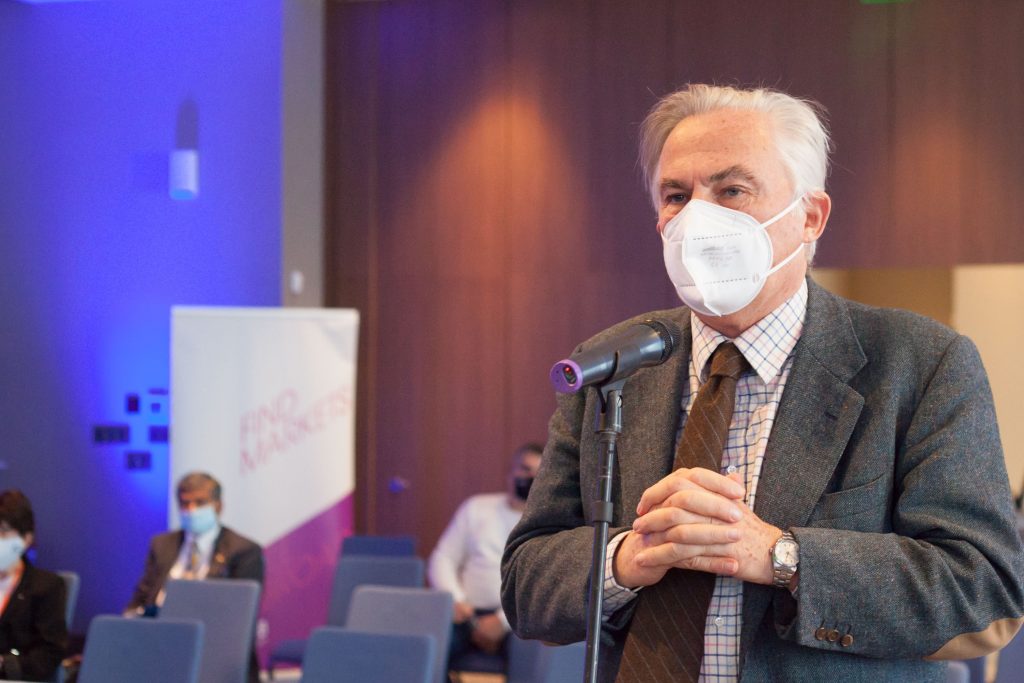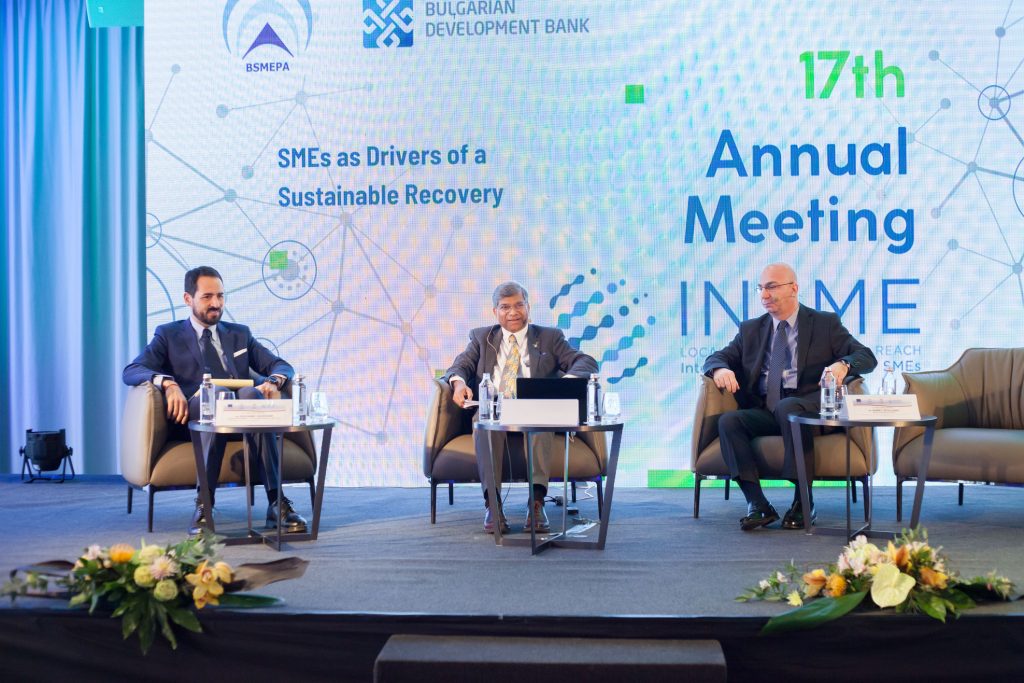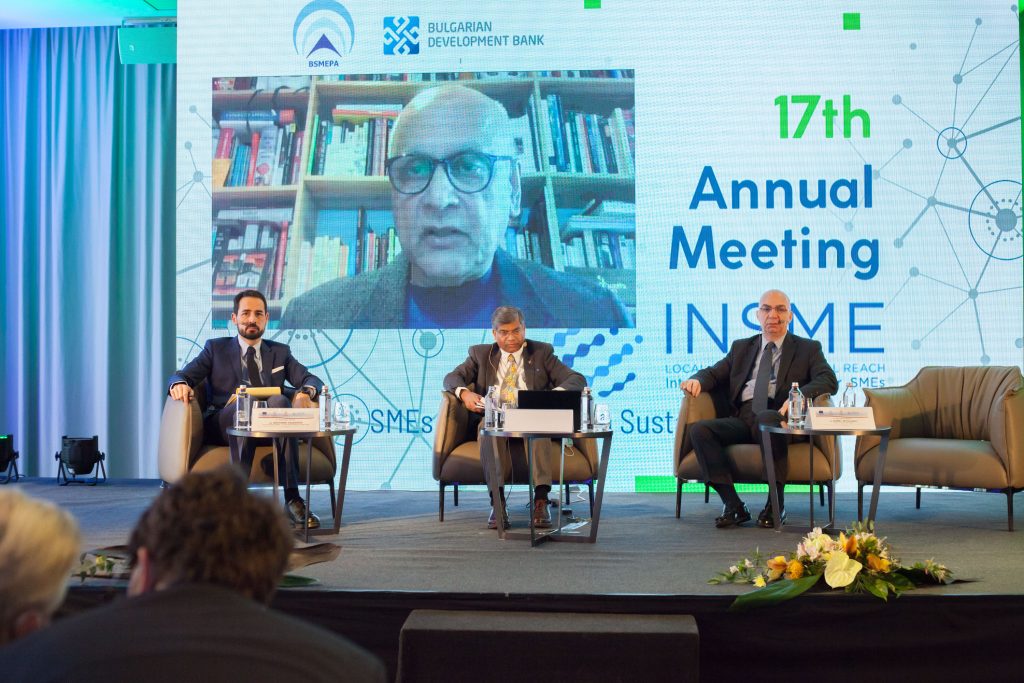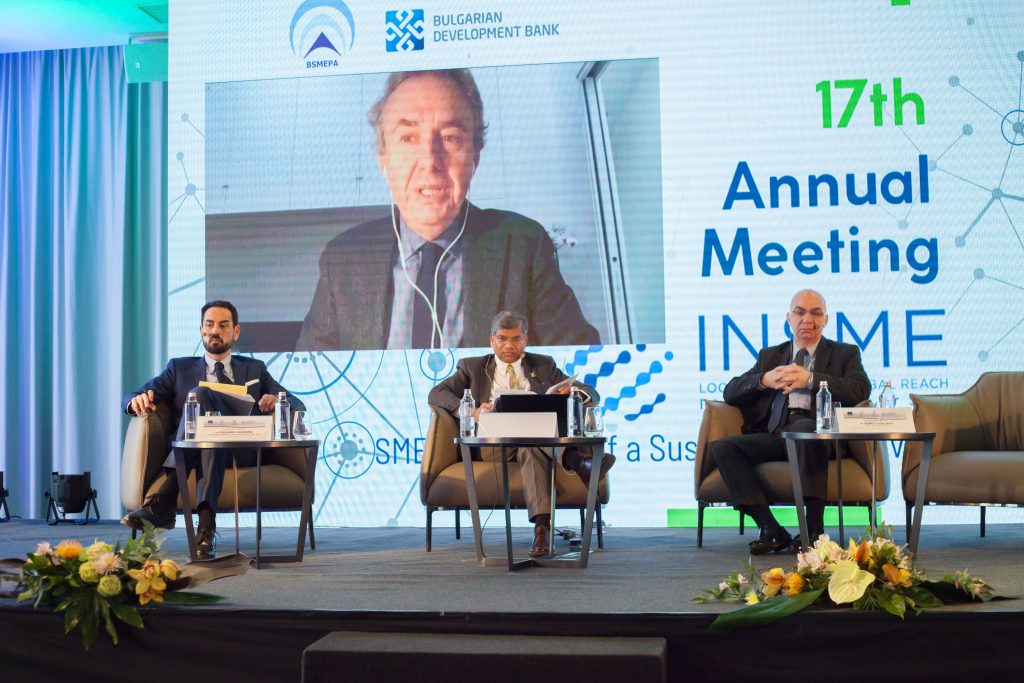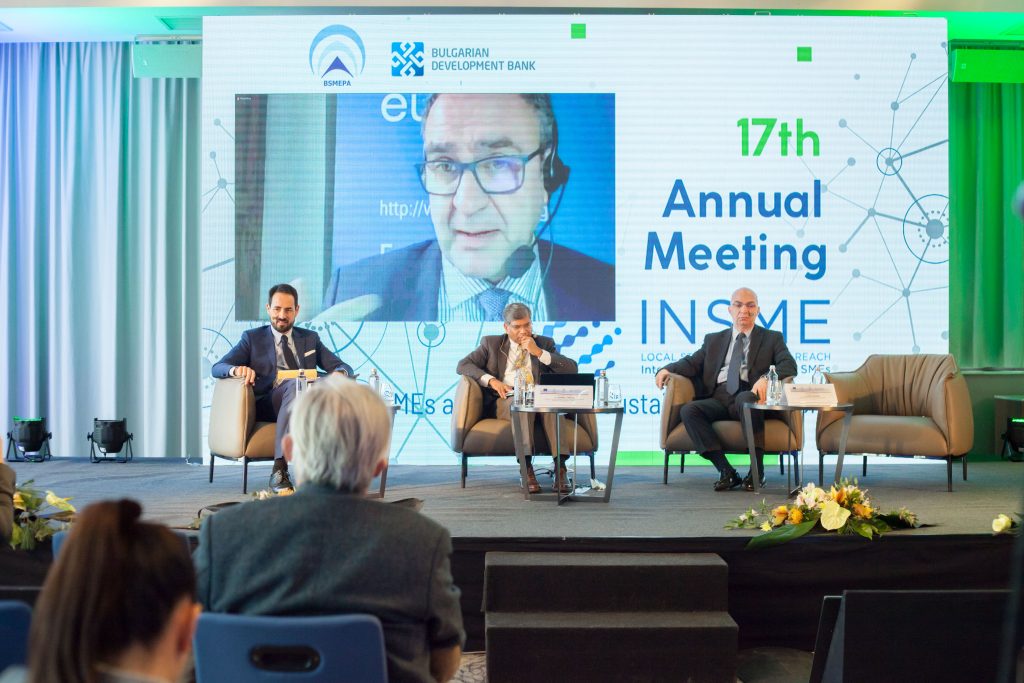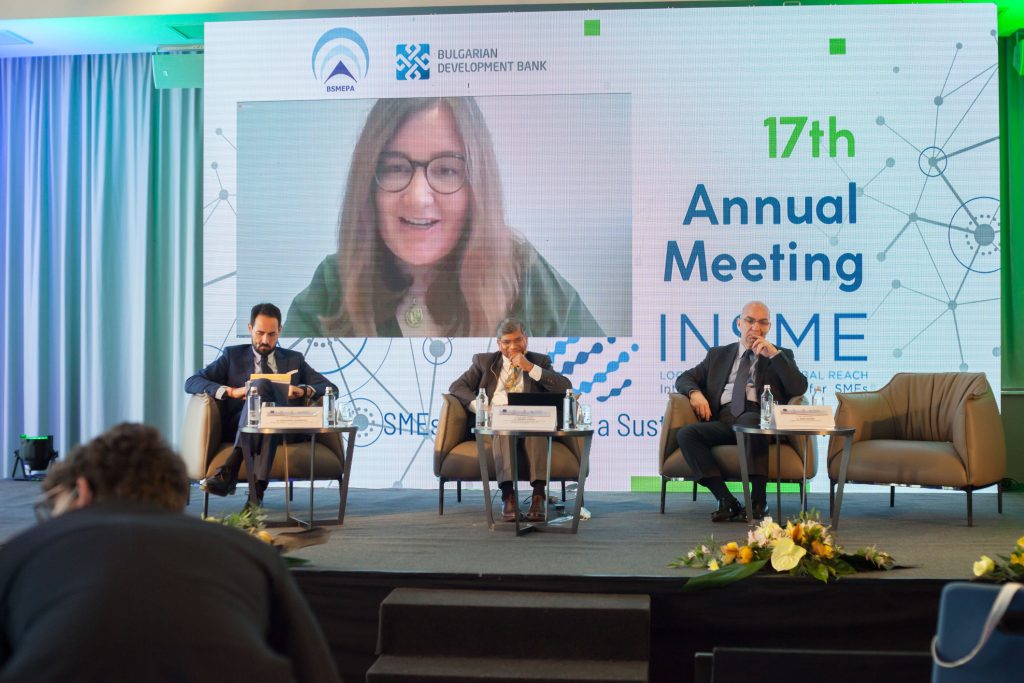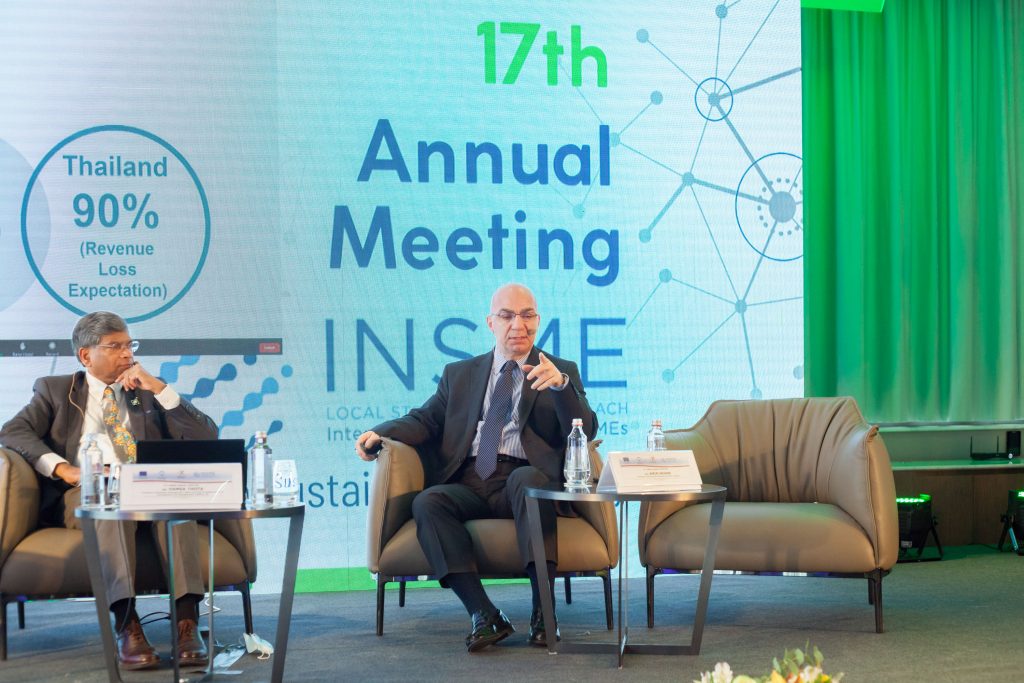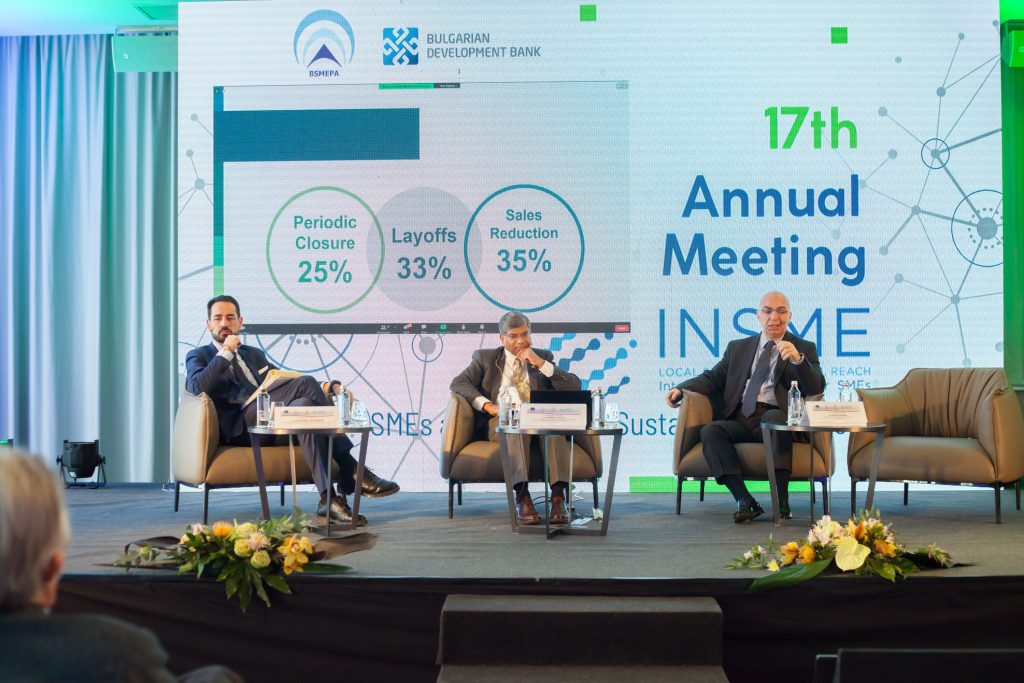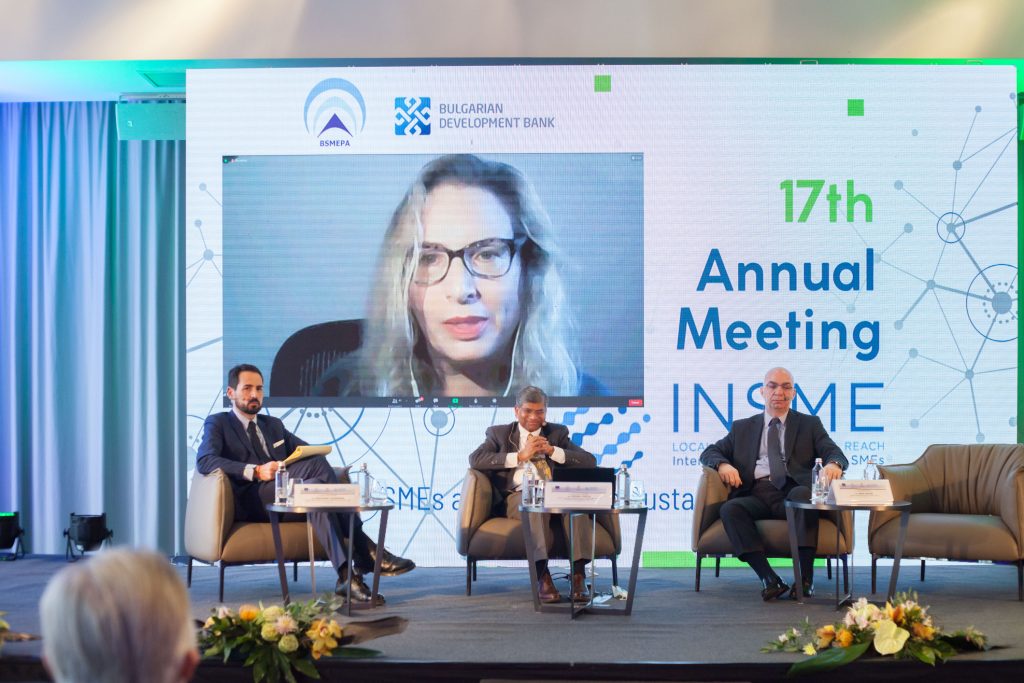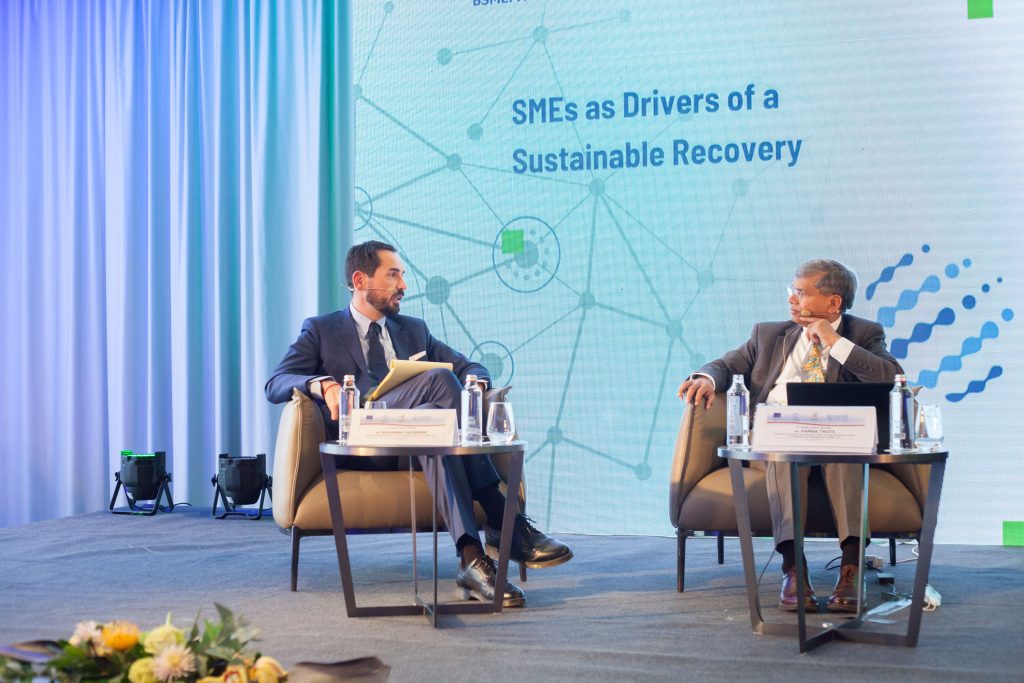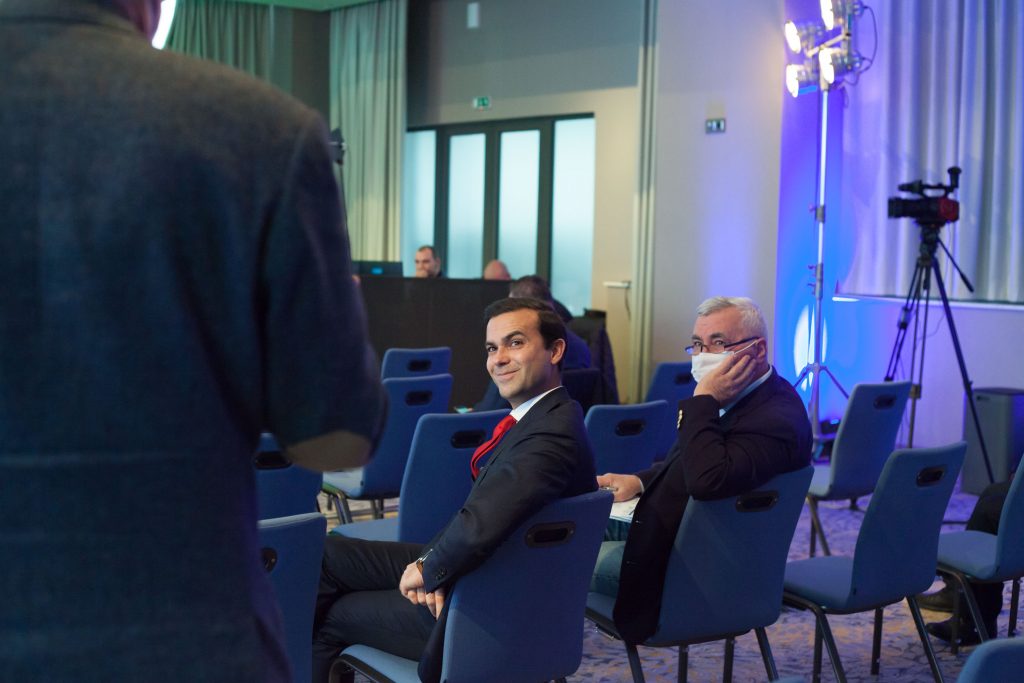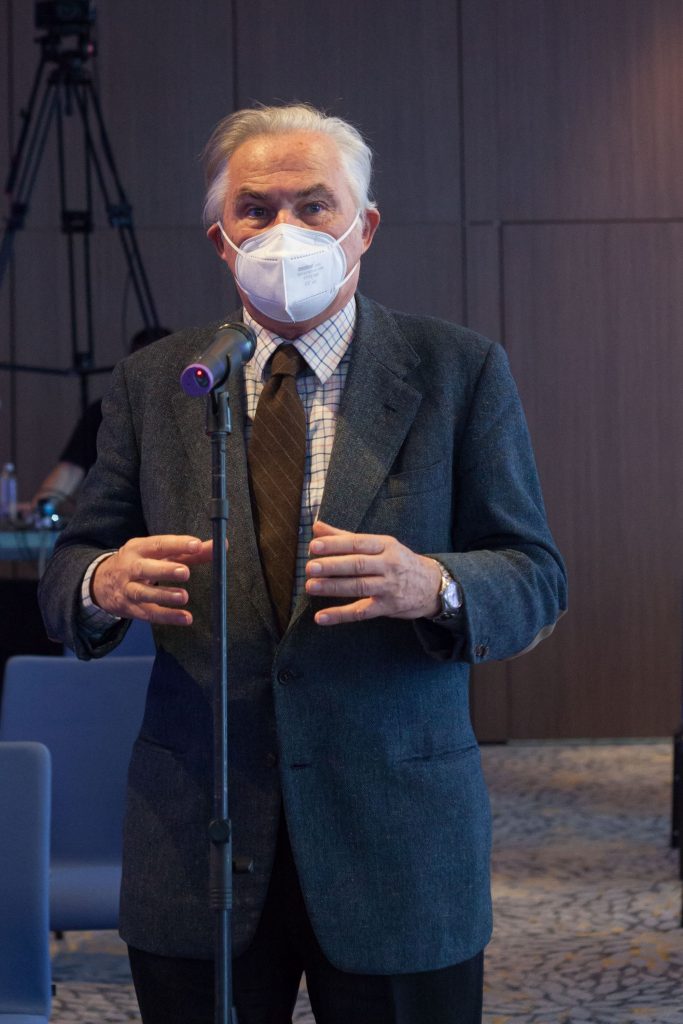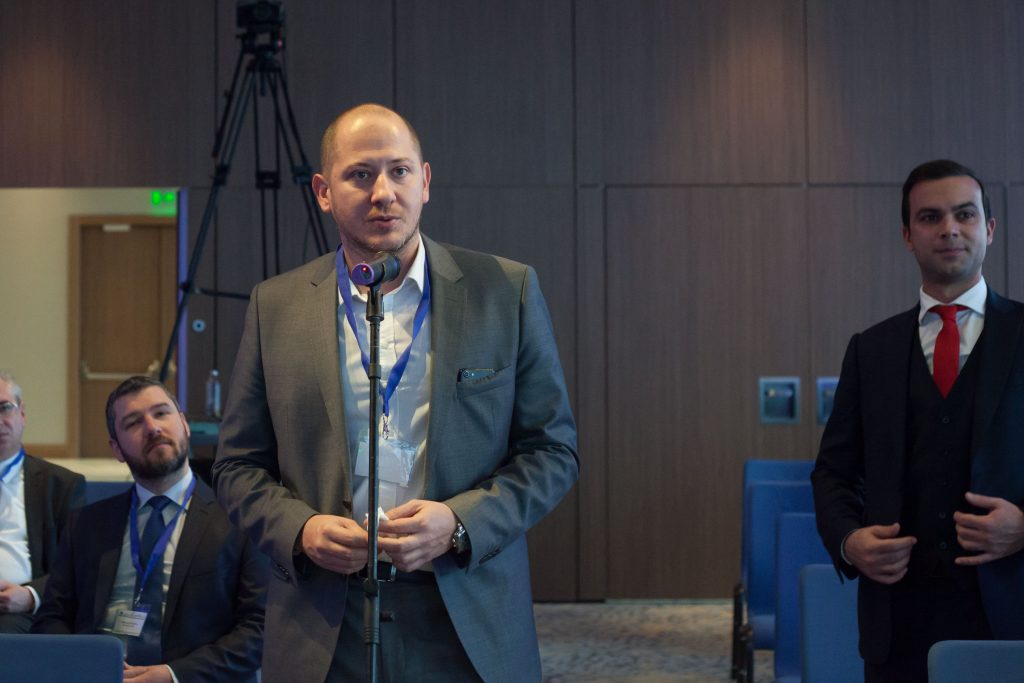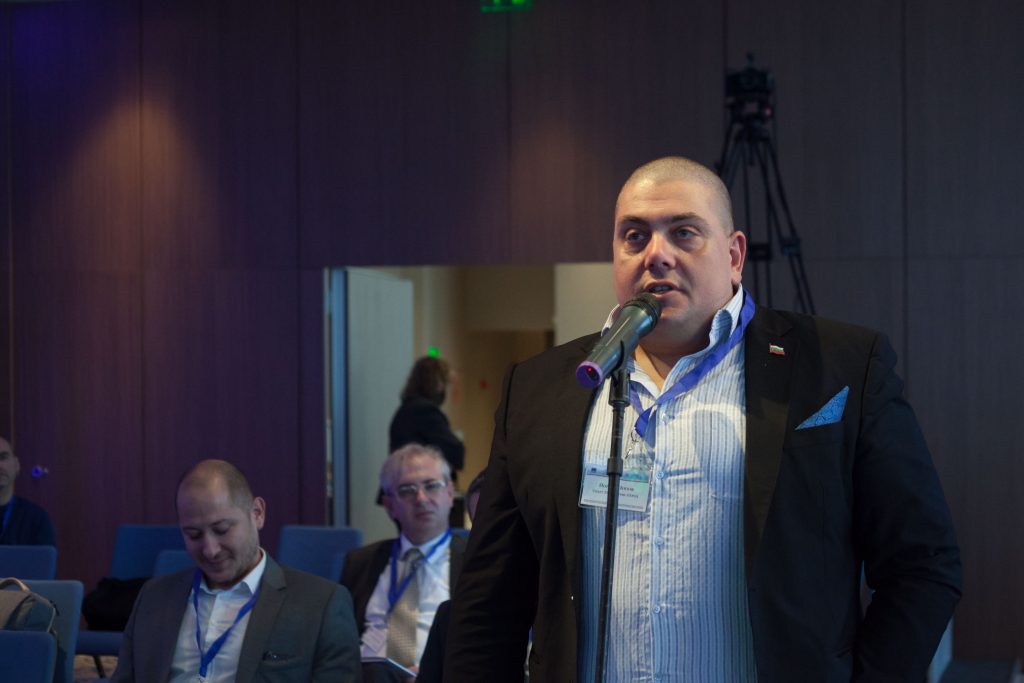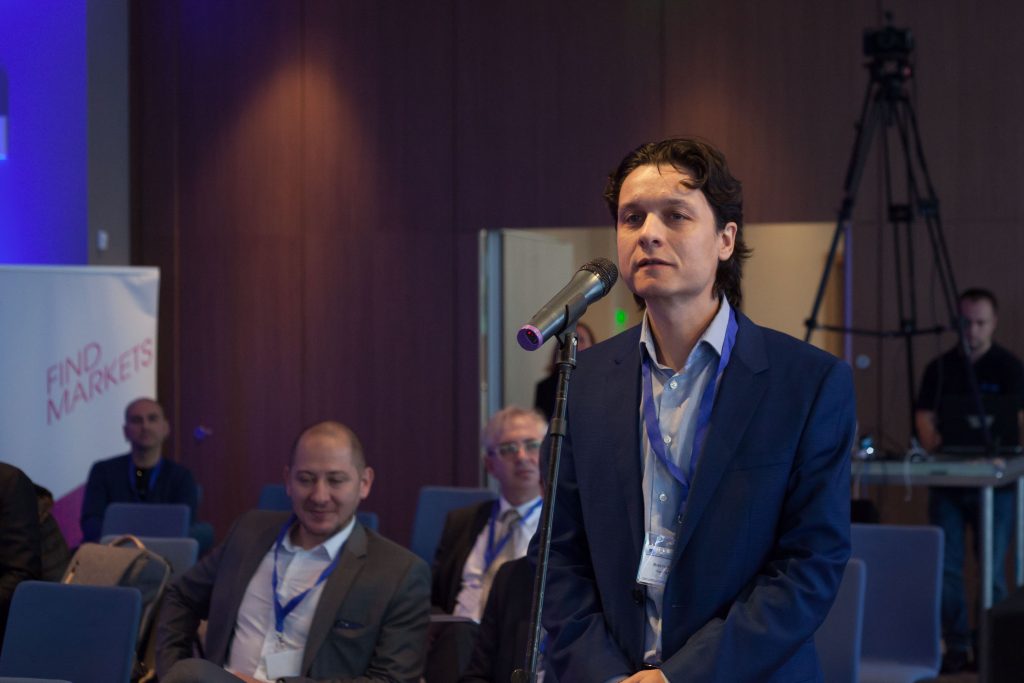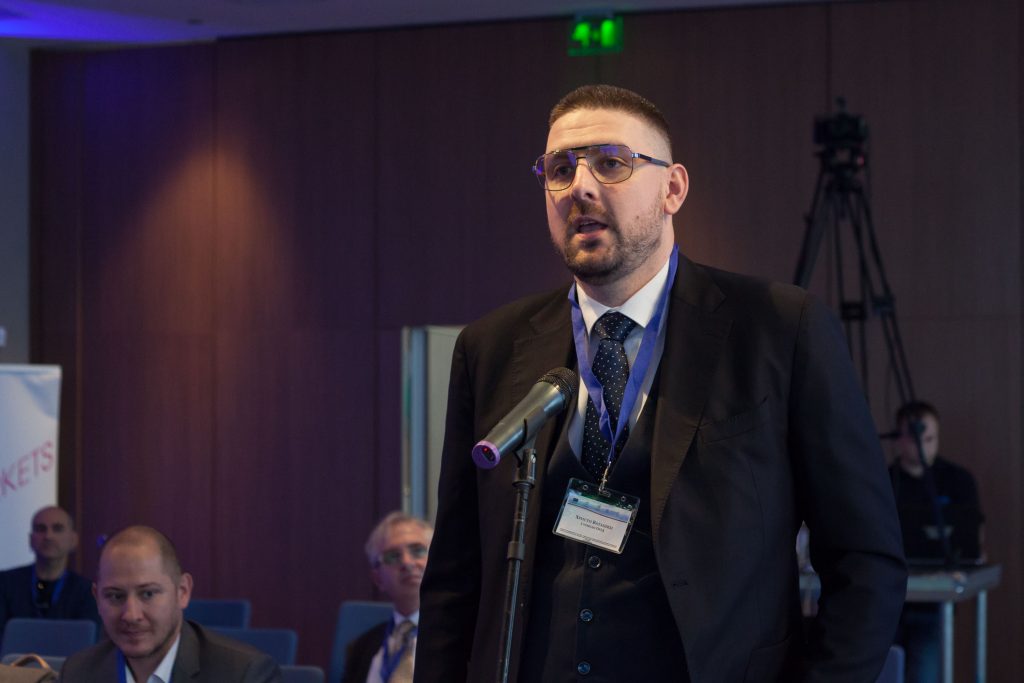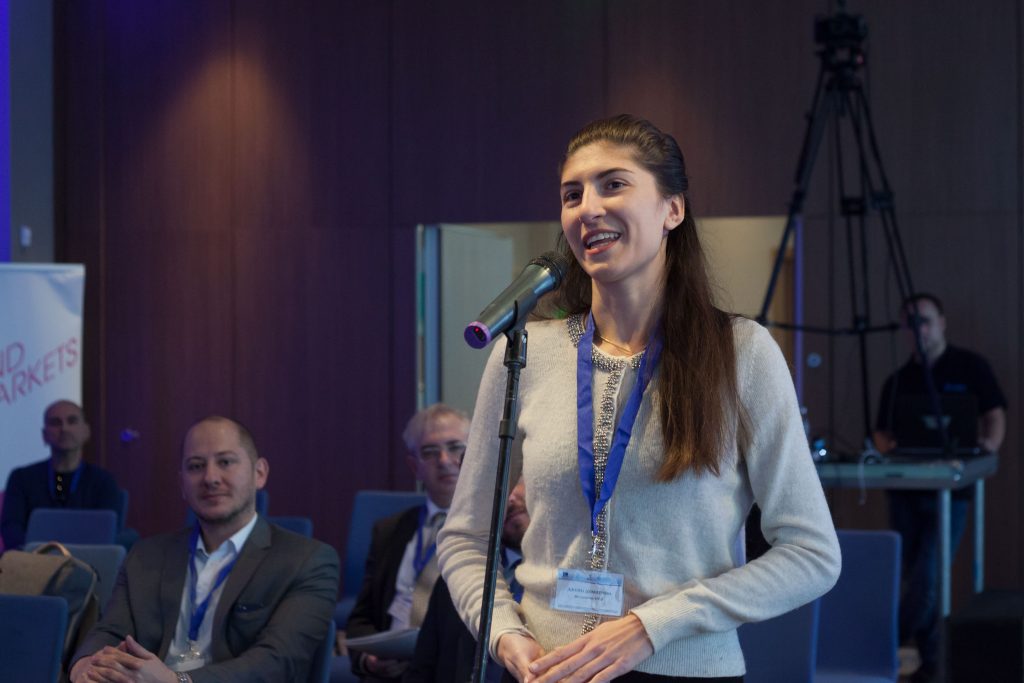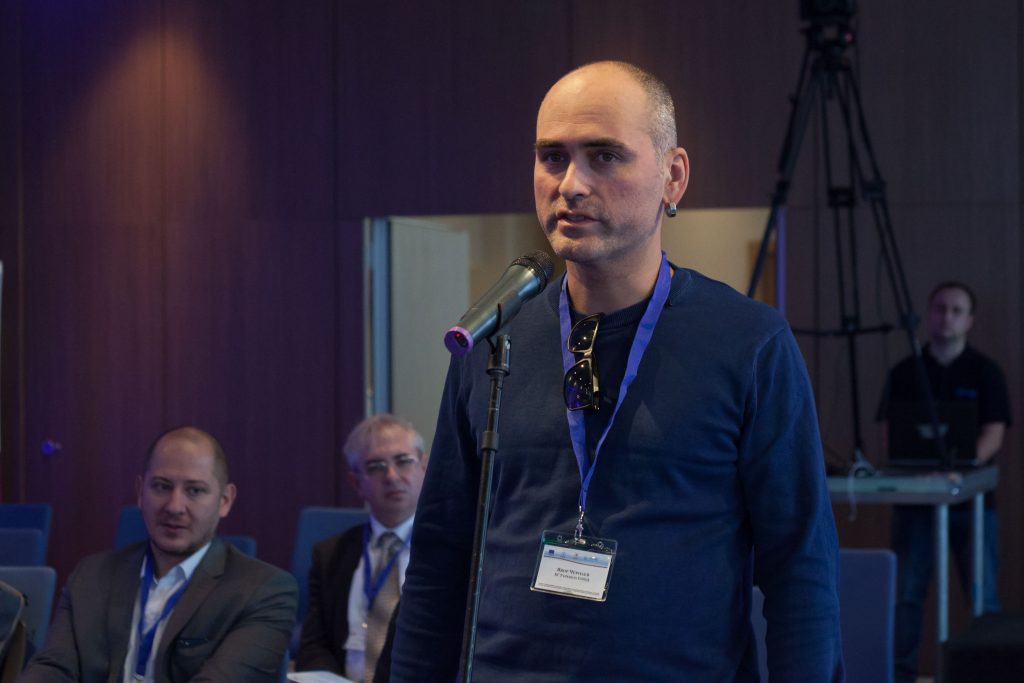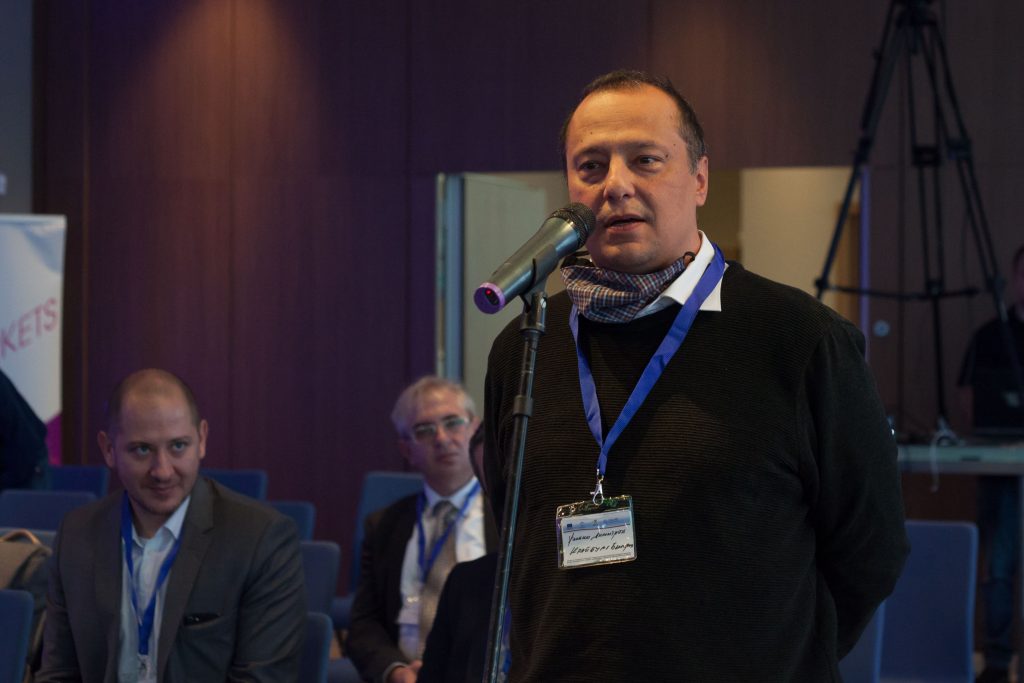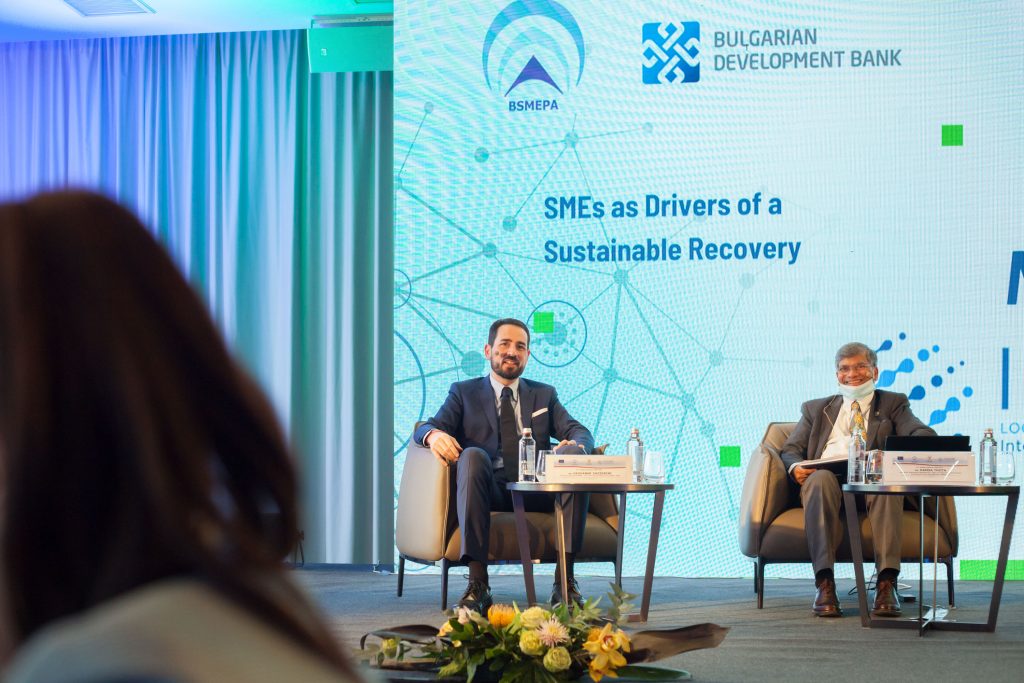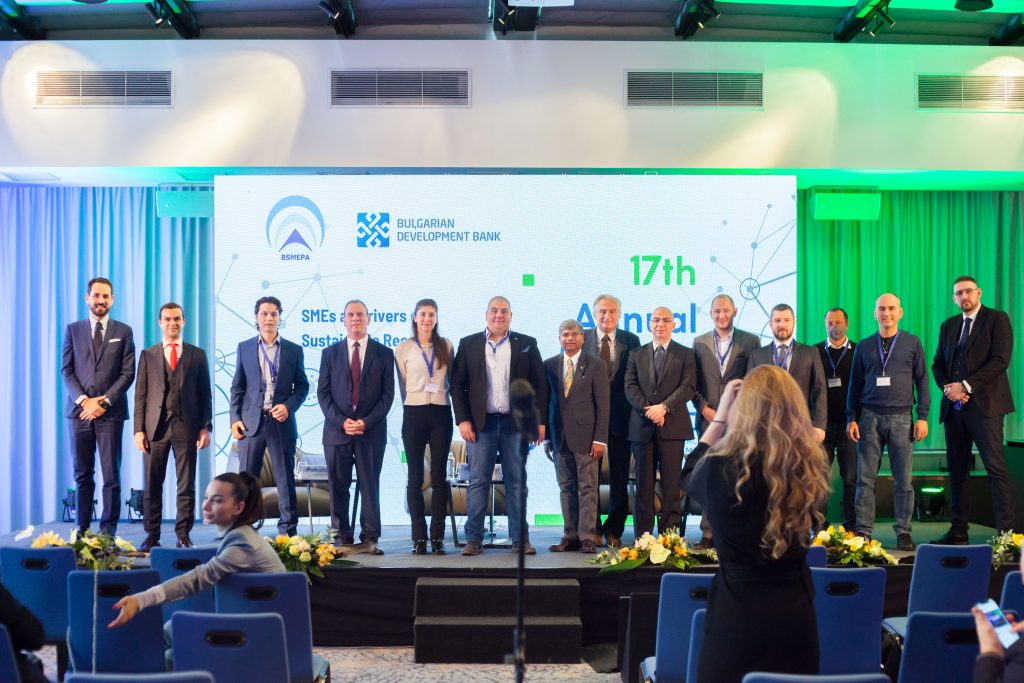17th INSME Annual Meeting
“SMEs as Drivers of a Sustainable Recovery”
9-10 December 2021
Sofia, Bulgaria
and Online
Co-organised with

Working under the auspices of

THEME
All over the globe, small and medium-sized enterprises (SMEs) create employment (two out of three jobs in Europe are provided by SMEs), and value added, bringing innovative solutions and spreading innovation. The Covid-19 pandemic severely affected small businesses, and the magnitude of the crisis requires governments to step in, developing policies to support their recovery and to help them build resilience to better face future crises. In the EU landscape, institutions are relying on sound recovery plans in order to “build back better” and to make the SME and entrepreneurship environment more effective, digital, efficient and sustainable (OECD, 2021). Conditions can be attached to bailouts and other types of assistance, structuring incentives and support measures in ways that transform the sectors they are saving, so that they become part of a new economy, focused on the green and digital strategy. It is still not clear what the future for entrepreneurs and startuppers, especially the youngest ones, will look like; but policymakers should “not let this crisis go to waste” (Mazzucato, 2020) and boost SME growth by facilitating access to finance and promoting internationalisation.
SCOPE
The INSME Annual Conference aims at:
- Identifying opportunities to enhance SME post-Covid19 recovery and productivity through innovation and internationalisation
- Presenting policy best practices aimed at fostering entrepreneurial ecosystems
- Understanding the current and future role of Business Support Organisations, Development Banks, and SME Promotion Agencies
HOST ORGANISATIONS
The Bulgarian Small and Medium Enterprises Promotion Agency (BSMEPA) is an administrative body within the Bulgarian Minister of Economy, which implements state policy for promoting entrepreneurship, development, and internationalization of SMEs. BSMEPA’s main goal in the field of internationalization is to provide support to Bulgarian enterprises for their stable development, successful integration into the European and global economy and expanding their presence on target markets.
The Bulgarian Development Bank (BDB) is a credit institution 100%-owned by the Bulgarian state. It was established in 1999 as the Encouragement Bank with the goal of supporting small and medium-sized enterprises. It offers medium and long-term financing and risk-sharing through guarantee schemes, leasing, factoring, and microfinancing to SMEs and start-ups. The BDB also invests in key sectors of the economy such as infrastructure, exports, agriculture, energy efficiency, and public projects of national importance.
REGISTRATION
To register for the event, click here. Attendance is free of charge.
CONFERENCE OUTLINE
N.B. All times indicated in Eastern European Time (EET) check your time zone here.
*Speaker will be connecting remotely
THURSDAY, DECEMBER 9th, 2021
11:00 – 13:00 Opening Session
Chair
- Sergio Arzeni, President INSME – The International Network for SMEs, Italy
Speakers
- Yordanka Fandakova, Mayor of Sofia, Bulgaria
- Valentin Mihov, Chairman of the Supervisory Board, Bulgarian Development Bank, Bulgaria
- Giancarlo Giorgetti*, Italian Minister for Economic Development, Italy
- Markus Jerger*, Executive Director, Der Mittelstand/BVMW, Germany
- Jay Mitra*, Professor University of Essex Business School, INSME Board Member, UK
- Yves Leterme, Former Belgium Prime Minister and Deputy Secretary General OECD – Organization for Economic Cooperation and Development, President of ToJoy Western Europe, Paris
- Lamia Kamal-Chaoui*, Director OECD Centre for Entrepreneurship, Cities and Regions
- Maurizio Casasco*, President CONFAPI – Italian Confederation of SMEs, Italy and European Entrepreneurs, Brussels
- Orkhan Mammadov*, Chairman, Small and Medium Business Development Agency of the Republic of Azerbaijan, Azerbaijan
13:00 – 14:00 Networking Lunch
14:00 – 16:00 Session I – Tackling the post-Covid-19 Recovery
Organisations representing SMEs and start-ups play a crucial role in gathering, analysing and collecting data about new and old companies to fuel evidence-based policymaking. Such organisations should always be informed of the challenges faced by SMEs across sectors and regions, to design and execute effective policies to support SMEs in boosting their competitiveness and in taking advantage of new opportunities. New and small firms are important creators of jobs and innovation, even in times of recession or crisis, when they play a key role in replacing jobs destroyed elsewhere, and this will be particularly true in the post-Covid-19 era.
Contributing to building efficient entrepreneurial ecosystems is one of the objectives of organisations representing SMEs, as well-performing business ecosystems have a crucial impact on the speed and ability with which entrepreneurs and organisations can create and scale new ventures in a sustainable way. When tackling the post-Covid-19 recovery, such entities must aim at strengthening the innovation ecosystem as a whole and help SMEs reach a higher level of resilience. SME confederations, trade associations, chambers of commerce, and accelerators must give their outmost in order to provide guidance, training, funding and policy advisory to their represented entities and promote their competitiveness.
All over the world, organisations representing SMEs and start-ups should encourage institutions and policymakers to develop regional policies capable of enhancing innovation and internationalisation by improving productivity and growth, thus creating better jobs and well-being for citizens.
During this session, experts will address the following questions:
- What can business support organisations do to address the main challenges and opportunities for SMEs in the post-Covid-19 era?
- Which frameworks should be put in place today to build resilience and create a nurturing environment for SMEs?
- How can policymakers support BSOs in enhancing innovation and improving productivity?
Chair
- Patrick Meinhardt, Member of the Board of Directors, European Association of Self Employed, Germany
Speakers
- Alban Maggiar*, President SMEUnited, Belgium
- Galina Dremova, Head of Communications GenerationS, Russia
- Andrea di Carlo*, Deputy Executive Director, EUIPO – European Union Intellectual Property Office, Spain
- Anita Amorighoye*, Director Ayzer Centre for Entrepreneurship, Nigeria
- Peter Jungen*, Chairman of Peter Jungen Holding GmbH, EBAN President Emeritus, Germany
- Jaime Del Castillo*, Infyde, Spain
- Rym Ayadi*, President EMEA – EuroMediterranean Economists, Spain
Closing Remarks
- Giuseppe Tripoli*, Secretary General Unioncamere – Union of Italian Chambers of Commerce, Italy
16:00 – 18:00 Session II – The Role of Development Banks in Supporting SMEs
The shock caused by Covid-19 has led to deep recessions in many countries, affecting emerging markets and developing economies disproportionately. As access to finance is one of the most pressing challenges for SMEs globally, development banks have a fundamental role in financing small businesses, through direct or indirect loans (lending to private banks that then lend to SMEs), or by providing loan guarantees which reduce a bank’s exposure in case of default, facilitating loan access for entrepreneurs.
In this context, state-owned development banks are now redesigning their activities, moving from mainly suppling capital to businesses in case of private sector reluctancy, to financing young, innovative firms and providing green financing, as sustainability has finally become a prominent concern. Through this new approach, these institutions are supporting the creation of a greener and more digitalised environment for SMEs, helping entrepreneurs and small businesses build back better and greener while investing in long term infrastructure in many countries, thus enhancing local entrepreneurial ecosystems in the long run.
The role of development banks is evolving and growing: recognising that the needs of entrepreneurs go beyond mere financial assistance is leading some institutions to offer new services, such as technical assistance, finance training, coaching and business advice to help business owners in developing their competences, helping them to scale up and ameliorate their capacity. After 2009’s financial crisis, development banks supplied business credit when the private sector withdrew, reacting quickly and effectively to the crisis by increasing their lending to SMEs and supporting the economic recovery. The same phenomenon often takes place after natural disasters as well, as they frequently help SMEs recover and resume operations. Such endeavours are expected to occur again after the shock caused by the pandemic, as development banks are already putting in place solutions to encourage job creation and innovation, with the aim of surpassing pre-pandemic levels.
Panellists will discuss the following issues:
- Which are the new priorities to be set by development banks in order to strengthen the post-Covid-19 entrepreneurial ecosystem?
- Do development banks have a brand-new role in supporting SMEs, and which best practices involved in SME innovation support have been indentified after 2 years of pandemic?
Chair
- Iliya Lingorski, Chief Economist Bulgarian Development Bank, Bulgaria
Speakers
- Pascal Lagarde*, Chair of the Montreal Group of Development Banks, Executive Director BPI France, Paris
- Sandra Peloquin*, Secretary General Montreal Group, Director BDC, Business Development Canada
- Jean-Pierre Di Bartolomeo*, President, Sowalfin, Belgium
- Juuso Heinilä*, Executive Vice President, Finnvera, Finland
- Marek Tomszuk*, Managing Director for Financial Products Development, Polish Development Bank, Poland
- Goran Katušin*, Member of the Management Board, Slovenian Development Bank
Closing Remarks
- Enrico Petrocelli*, Head of International Institutional Relations, Secretary General of D20 Long-Term Investors Club , CDP, Italy
FRIDAY, DECEMBER 10th, 2021
9:00 – 11:00 Session III – SME and Entrepreneurship in South-East Europe
Over the last decades, the Western Balkan region has moved closer to the European Union (EU), by strengthening bilateral contractual and trade relations, political dialogue, and regional cooperation. After Bulgaria and Romania entered the EU in 2007, the Black Sea became a “Mediterranean Sea”, open to new development perspectives for SMEs (Eurispes, 2021). In general, Southeast European countries have faced many changes in recent years and have undergone important transformation processes in their political, economic and social systems. The creation of a strong private sector and a solid entrepreneurial ecosystem are core ingredients for a positive political and economic transformation. (OECD, 2007).
In this perspective, SME development agencies play a vital role in building the capacity of entrepreneurs to manage their businesses. When it comes to answer their needs, SME agencies are the main contact points with government representatives at a local level. Most of these agencies serve as a network of business incubators and offer business advisory services across their countries, with the general aim of improving the entrepreneurial ecosystem and helping firms with their critical issues (access to credit, fiscal guidance, debtors’ payment enforcement and more).
At a broader level, SME agencies can contribute to the development of a transparent financial sector and act as intermediaries and gatekeepers between the public and private sectors. Often, SME agencies play a crucial advocacy role by standing for SMEs in the legislative process.
What are the current and future challenges for SME agencies in South-Eastern Europe?
Panelists will address the following issues:
- Which are the most appropriate institutional structures and best practices for benchmarking?
- Which bottom-up approaches are the best for policy development, in order to build a more SME-friendly environment in South-Eastern European region?
- How did Covid-19 impact entrepreneurship education programmes carried out by SME Agencies?
Chair
- Boyko Takov, Director, Bulgarian Agency for SME Promotion
Speakers
- Christos Skouras, Director of International and Institutional Affairs, Enterprise Greece, Greece
- Traian Chebeleu*, Ambassador, Deputy Secretary General of the Permanent International Secretariat, Organization of the Black Sea Economic Cooperation, Romania
- Teymur Jafarov*, Advisor to the Chairman, Small and Medium Business Development Agency of the Republic of Azerbaijan, Azerbaijan
- Inga Juozapaviciene*, Entrepreneurship Department Director, Enterprise Lithuania
- Andriy Remizov*, Acting Director, EEPO – Entrepreneurship and Export Promotion Office, Ukraine
- Ahmet Jetullahu, Director, Prishtina REA, Kosovo
- Stanislav Todorov*, Acting CEI National Coordinator, Ministry of Foreign Affairs, Bulgaria
Closing Remarks
- Paolo Garonna*, Secretary General FEBAF Italian Federation of Banks, Italy
11:00 – 13:00 Session IV – The Twin Transition Toward Digitalisation and Sustainability
Scientists are observing changes in Earth’s climate in every region and across the whole climate system, according to the latest Climate Report released on August 2021 by the Intergovernmental Panel on Climate Change. The evidence is irrefutable, as greenhouse gas emissions are choking the planet and placing billions of people in danger (IPCC, 2021).
Back in November 2019, the European Commission emphasised the importance of reorienting policy efforts towards climate neutrality and Sustainable Development Goals (SDGs) and launched the European Green Deal and the Just Transition. The aim is to achieve climate neutrality by 2050 and reduce carbon emissions by 55% within 2030. The goal of transforming Europe to a globally competitive, climate neutral and digitalized economy is based on two pillars, the green and digital twin transition as a new Industrial Strategy.
The involvement of SMEs is fundamental for reaching this objective, and innovation is one of the most important factors contributing to these challenging medium and long-term objectives, as digital technologies, such as artificial intelligence, cloud computing, internet of things, can speed and scale up the process of decarbonisation.
Green growth and digital transformation should go hand in hand in driving the recovery, and SMEs should aim at accelerating their digitalisation. On the other hand, policymakers should have an holistic approach to rule-making, supporting open innovation, the creation of digital infrastructures, seeking greener technologies and circular economy (which save resources, increase efficiency and allow repairability and reuse of products, building on B2B relationships to create an innovation ecosystem). In turn, this will improve SME productivity in global value chains, adapt to changing and complex environments increase their resilience against future crisis.
During the panel, experts will address the following questions:
- Which are the most important SME-related actions to be taken by policymakers in order to accelerate the green and digital transition of SMEs?
- What are the best practices in facilitating the twin transition of SMEs and which principles are related to such practices?
- How can the effects of the pandemic be exploited to achieve national emission targets?
Chair
- Hamsa Thota, President Innovation Management (IBD) and Past President Product Development and Management (PDMA), US
Speakers
- Roberto Santolamazza*, Director T2i, Italy
- Esteban Pelayo*, Director, EURADA – European Association of Development Agencies, Belgium
- Lisa Berle*, Project Leader IMP3rove, Germany
- Amin Nehme, President Lebanese Development Network, Lebanon
- Gencho Kerezov, Deputy Mayor of Digitalisation, Innovation and Economic Development, Sofia Municipality
- Nava Swersky Sofer*, President and Founding Board Member, ICA – International Commercialization Alliance, USA
- Jay Mitra*, Professor University of Essex Business School, INSME Board Member, UK
Closing Remarks
- Giovanni Zazzerini, Secretary General INSME – The International Network for SMEs, Italy
13:00 – 14:00 Networking Lunch
14:00 – 17:00 INSME General Assembly (for INSME Members only)
- Financial statements approval
- Governing body election
- Present members’ new initiatives
- B2B meetings
PHOTOGALLERY
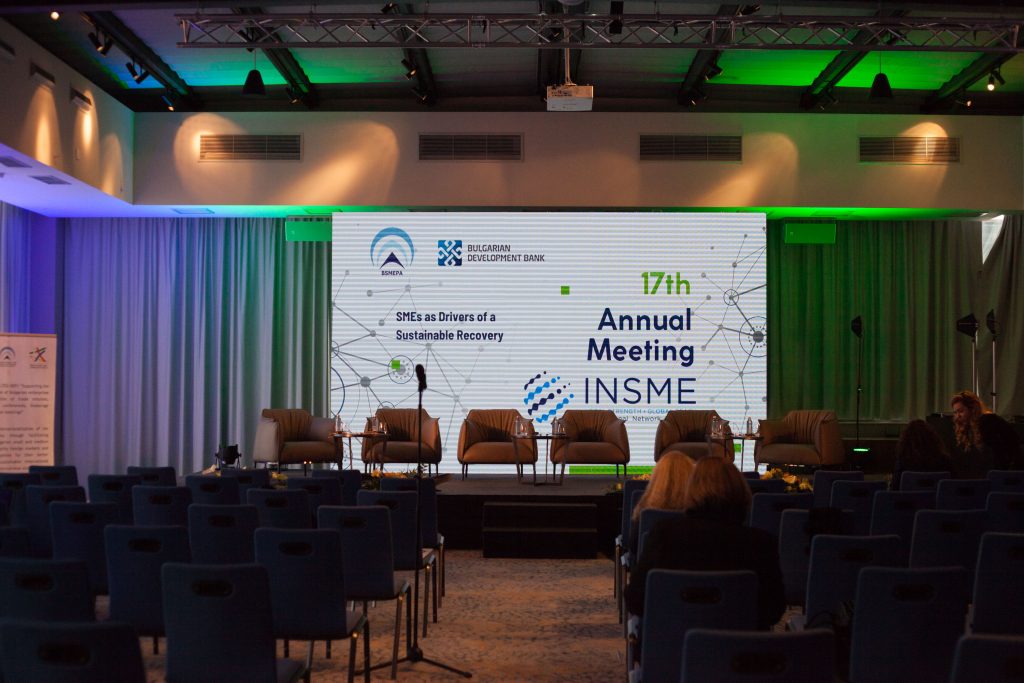
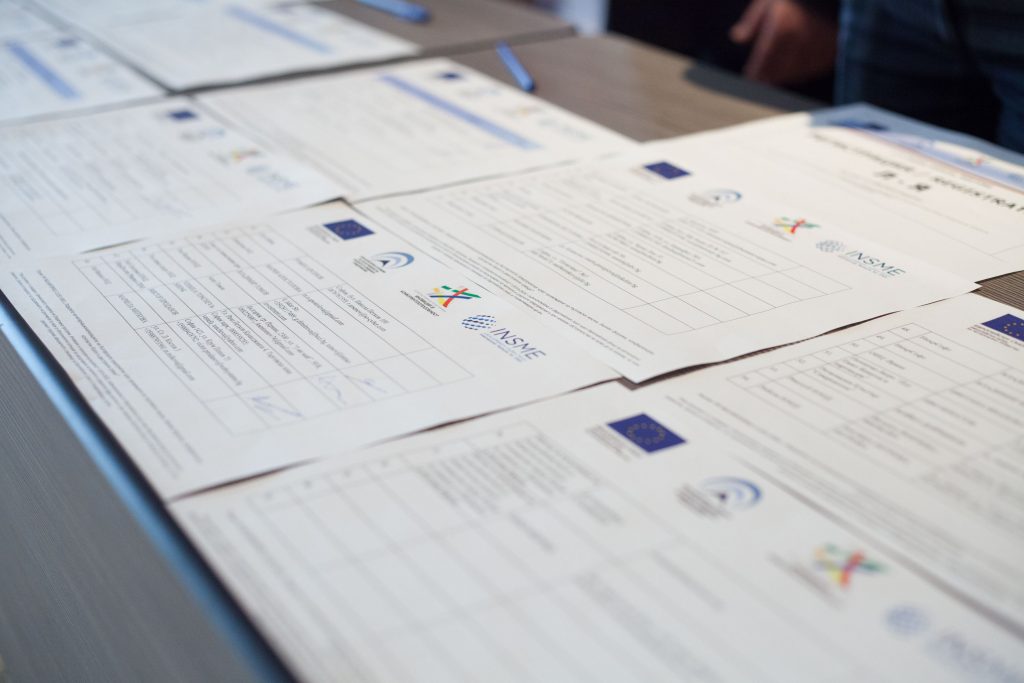
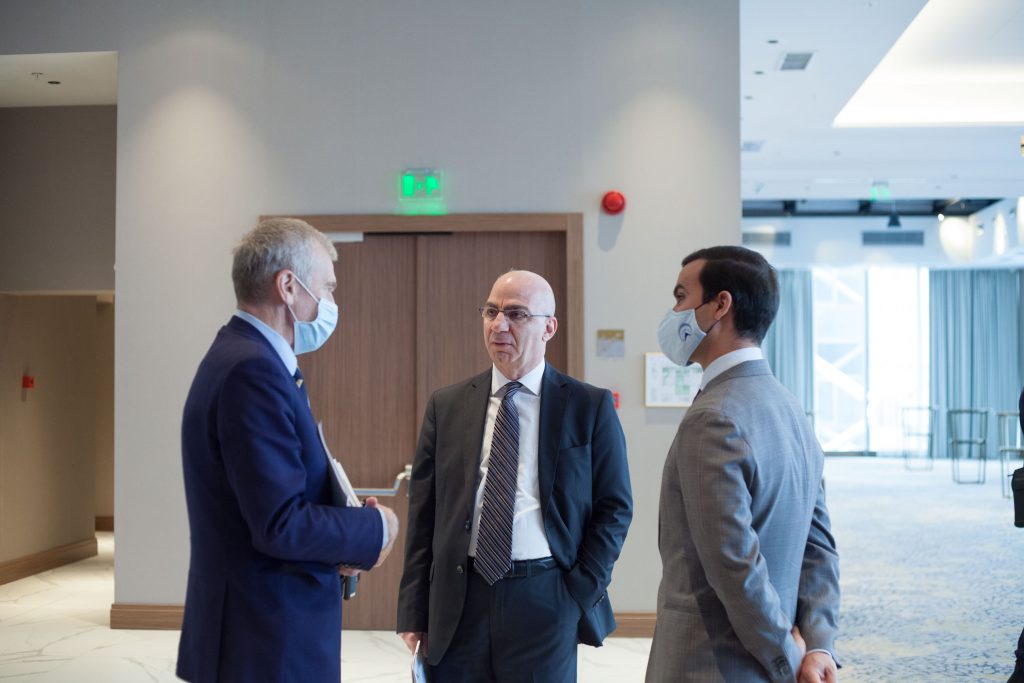
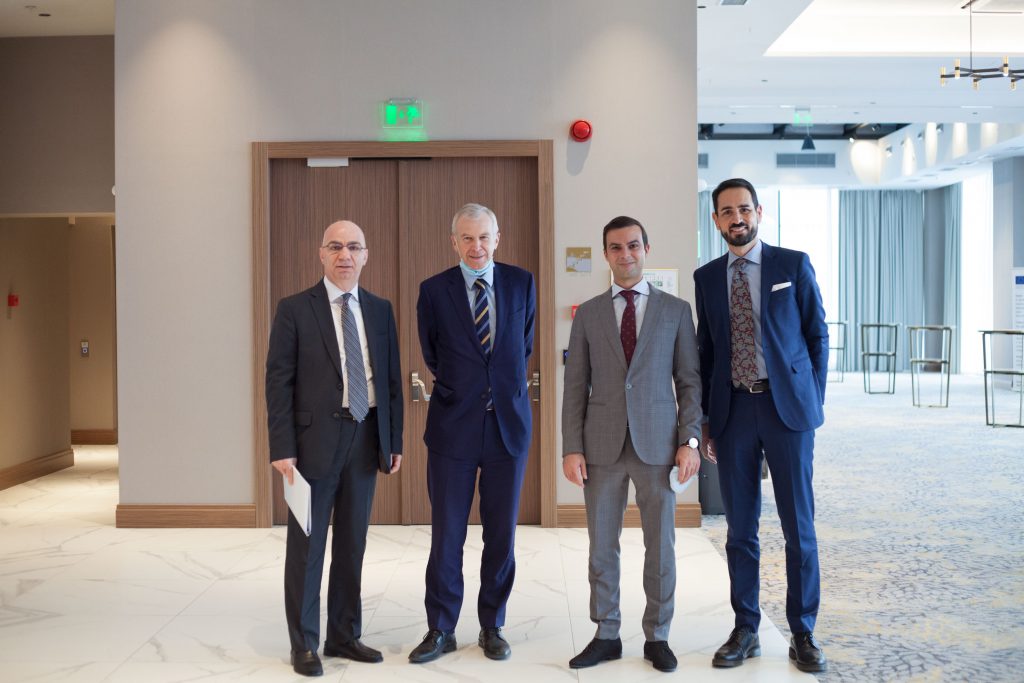
Amin Nehme, Yves Leterme, Boyko Takov, Giovanni Zazzerini
